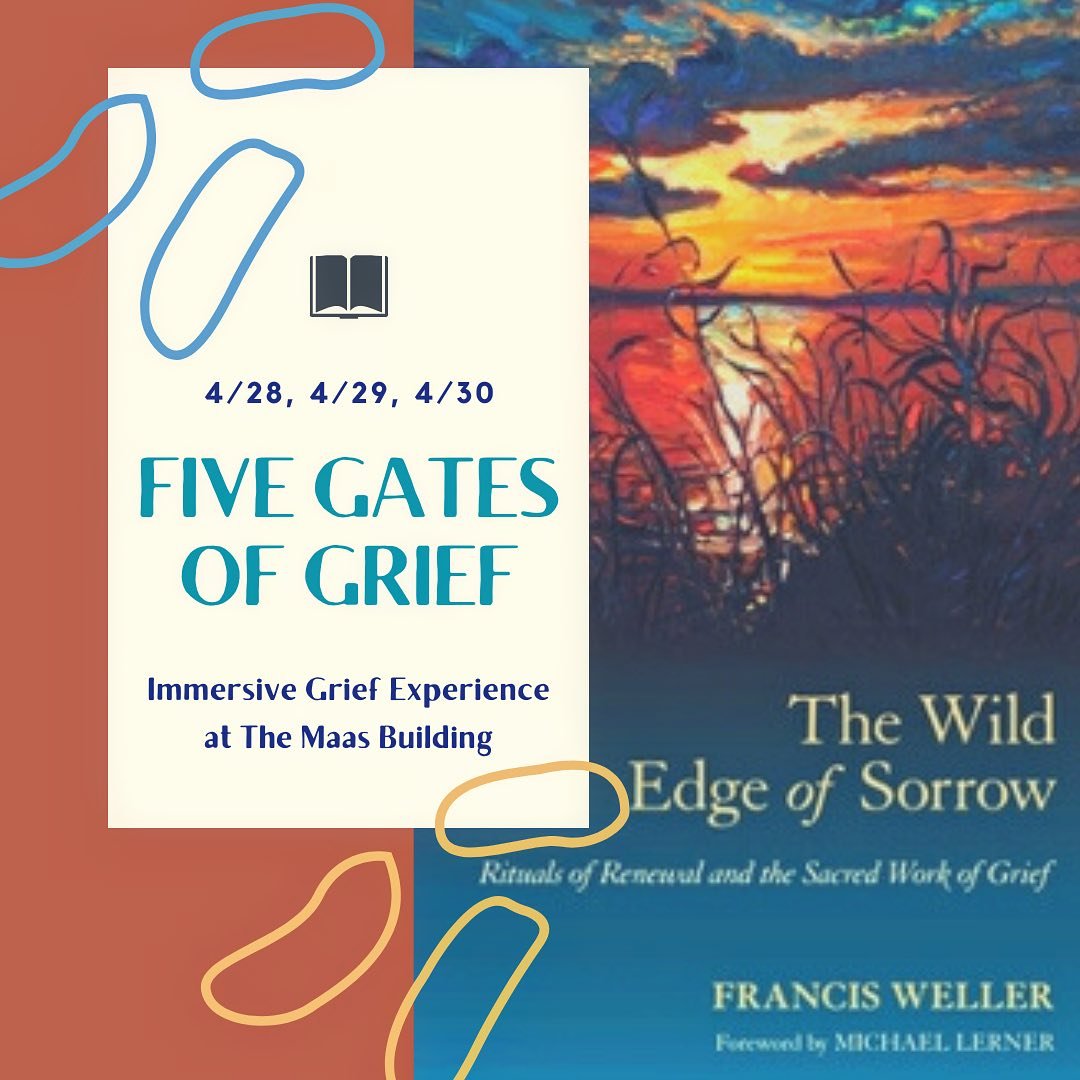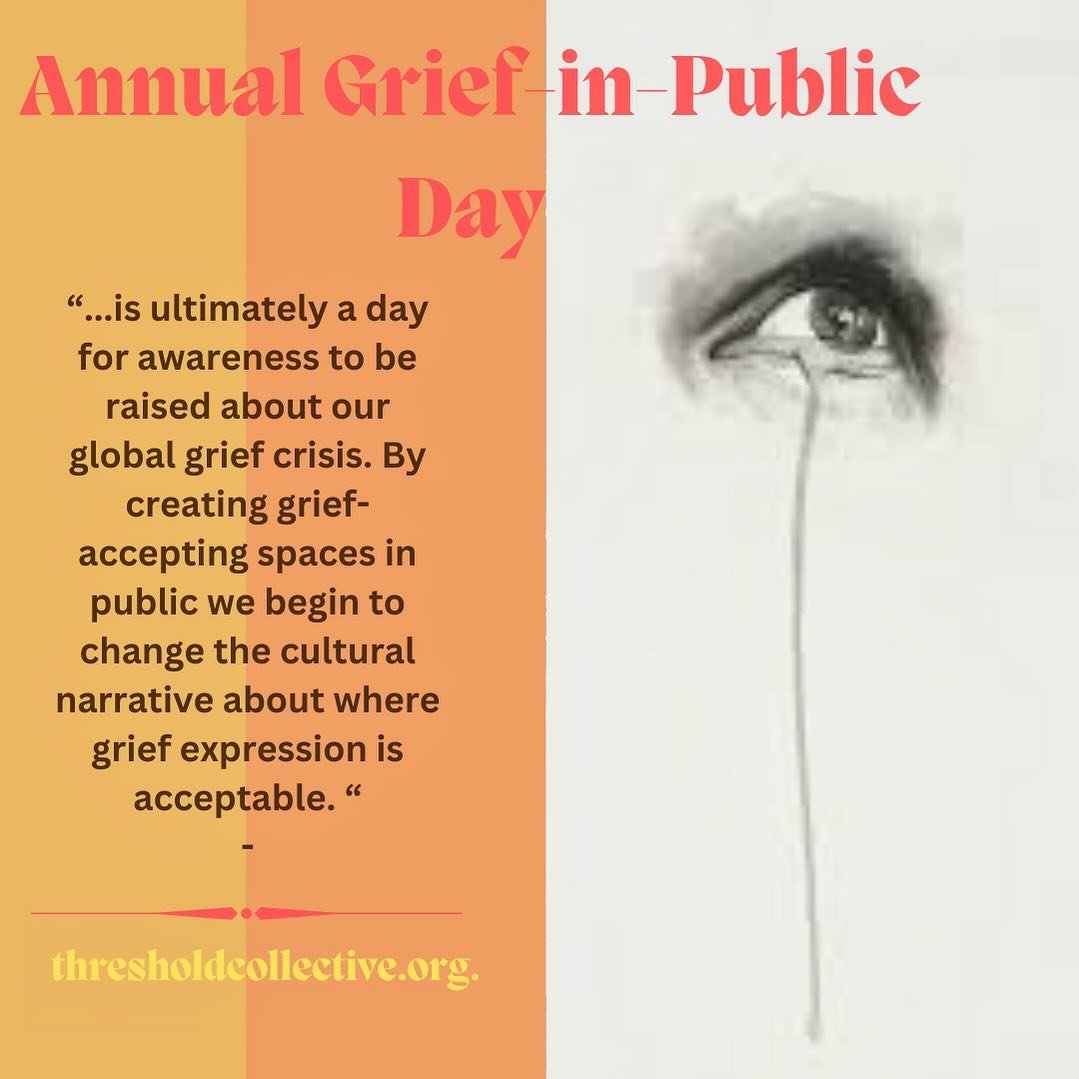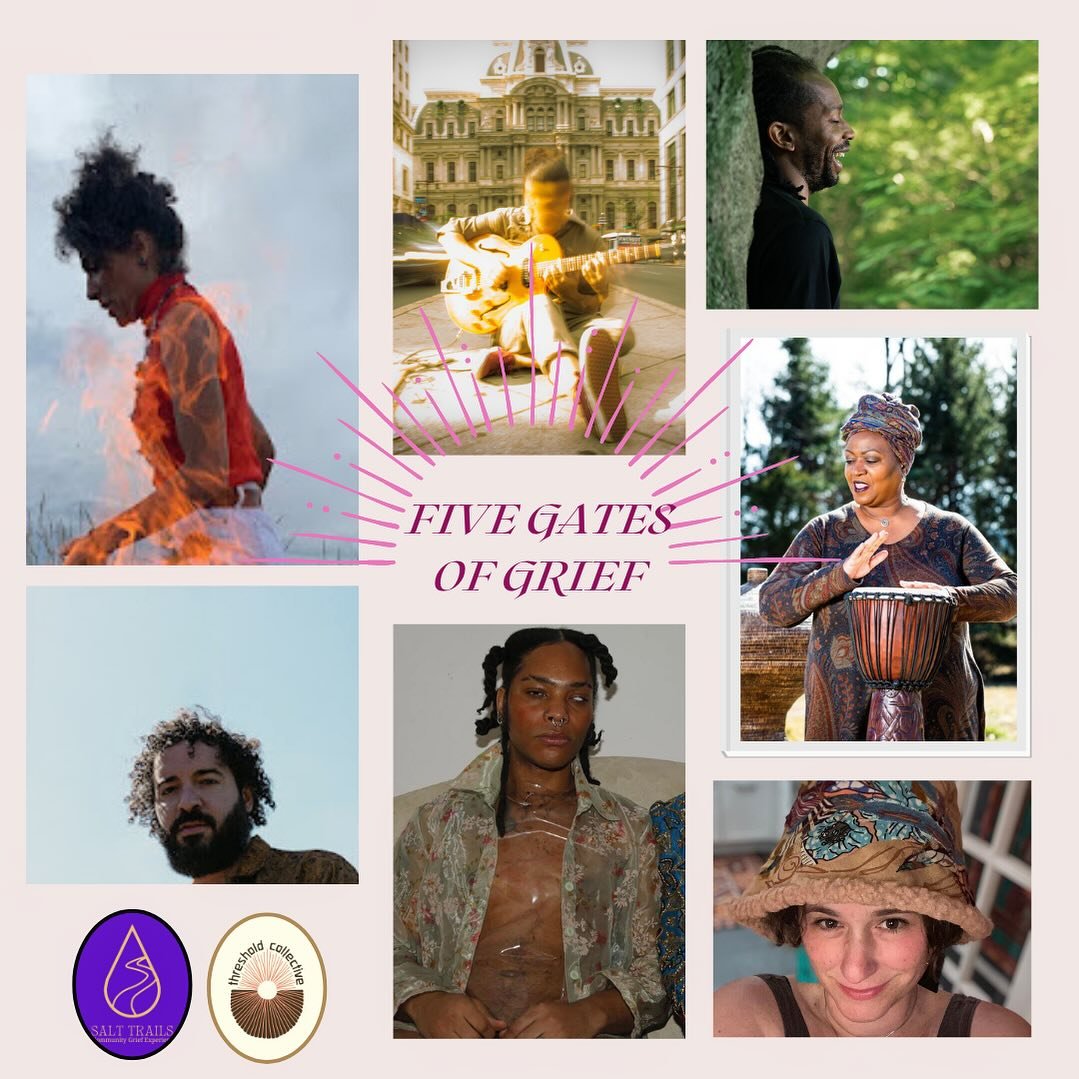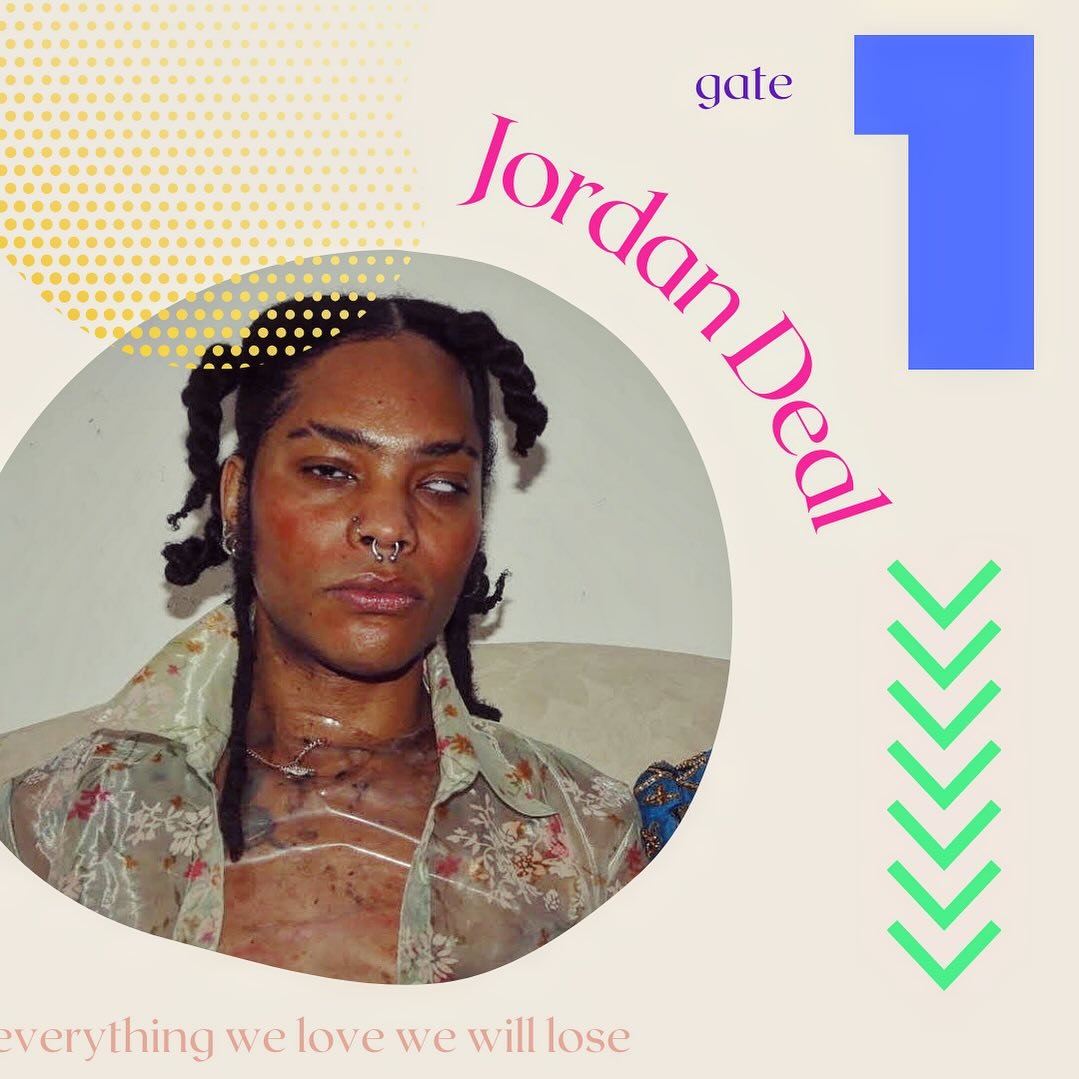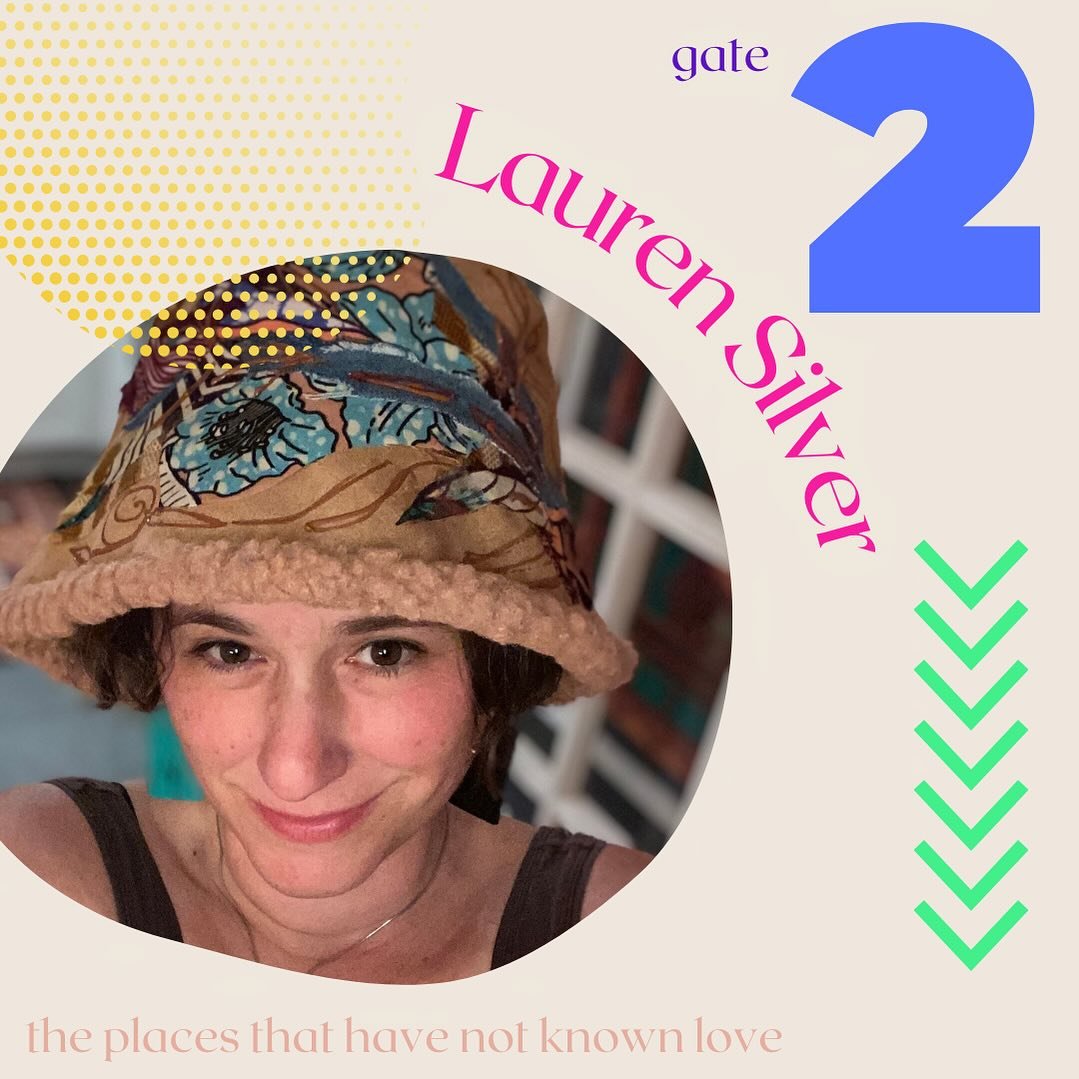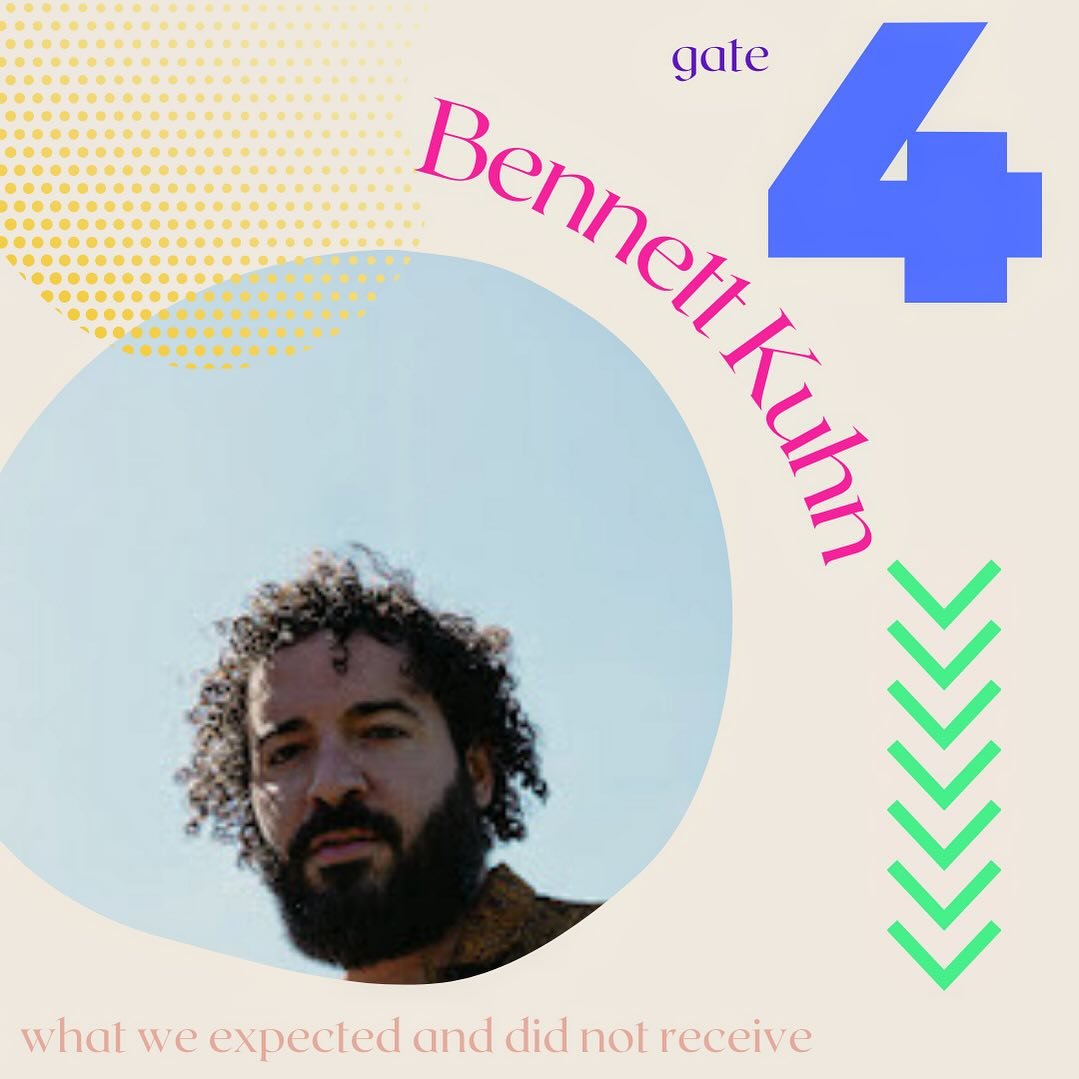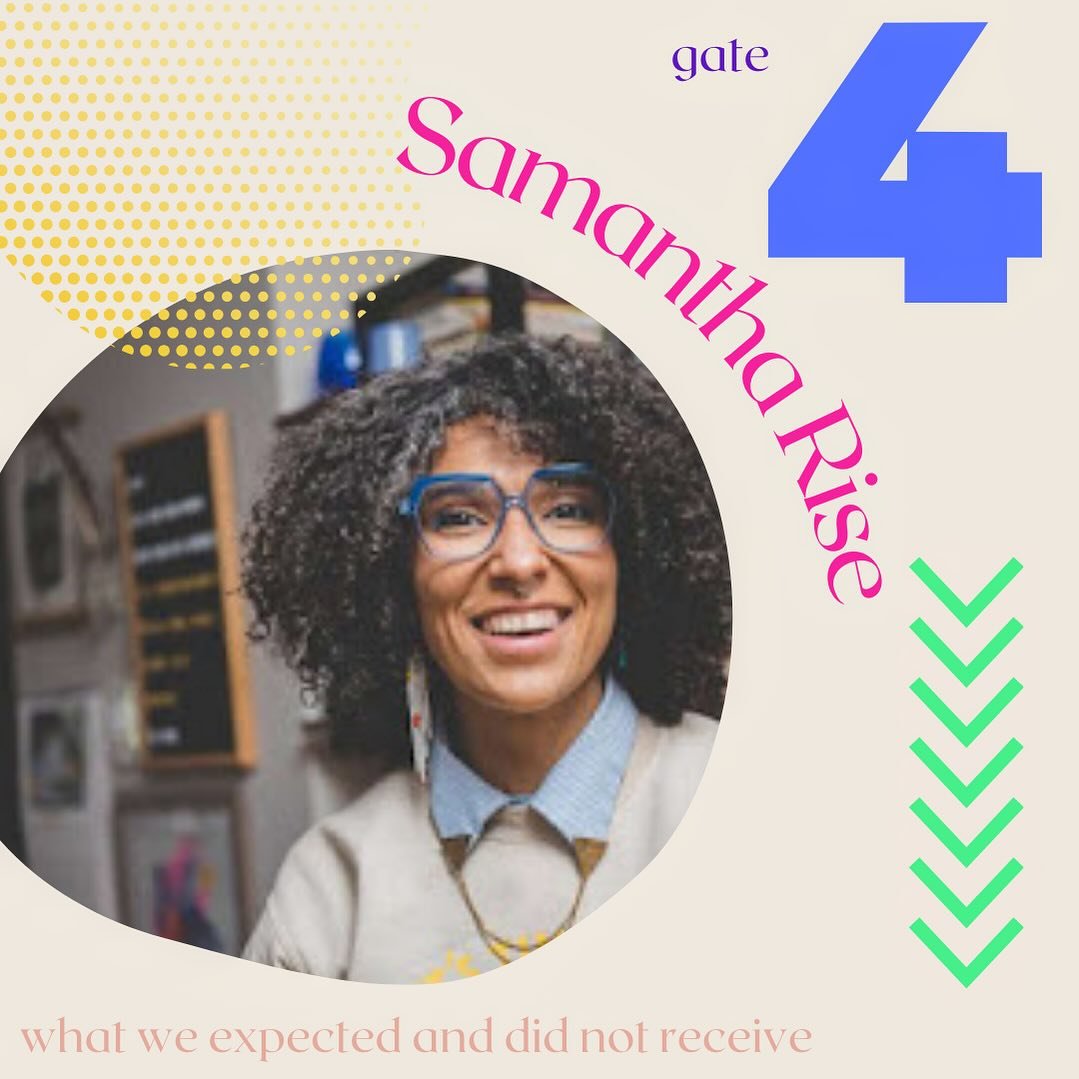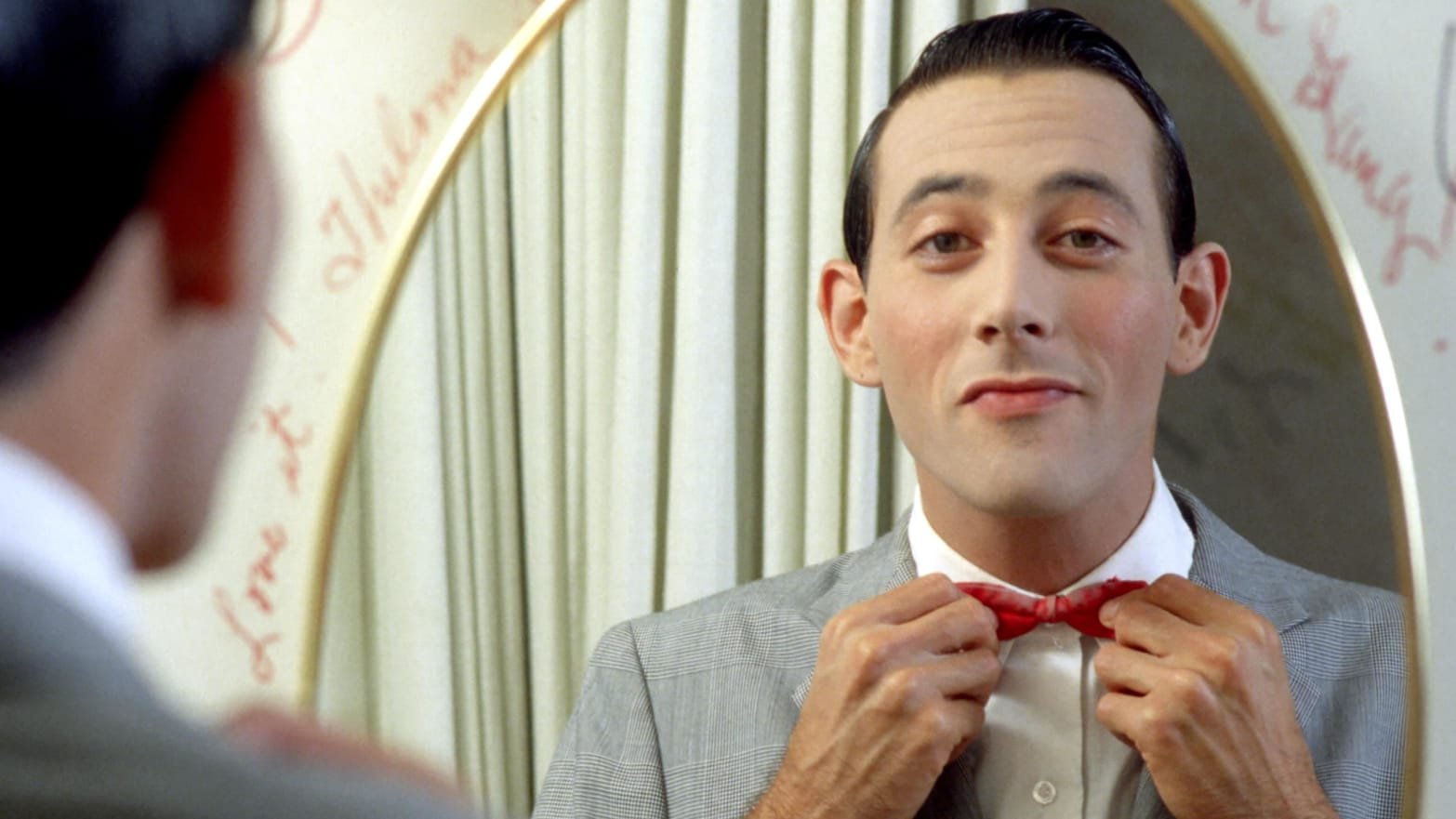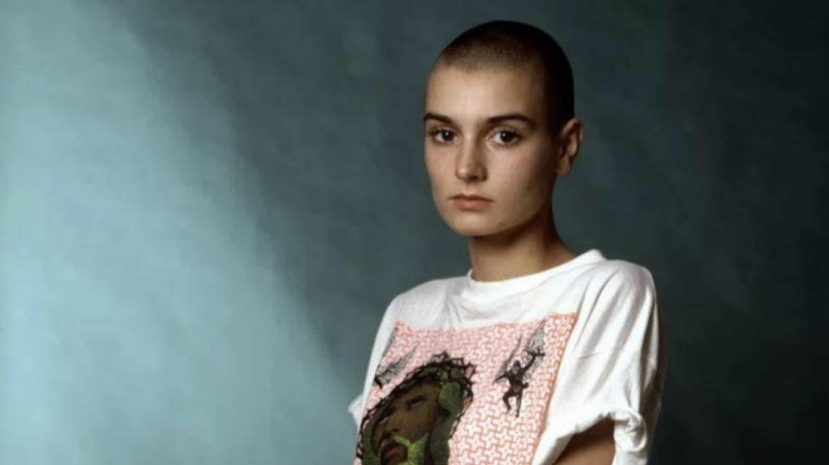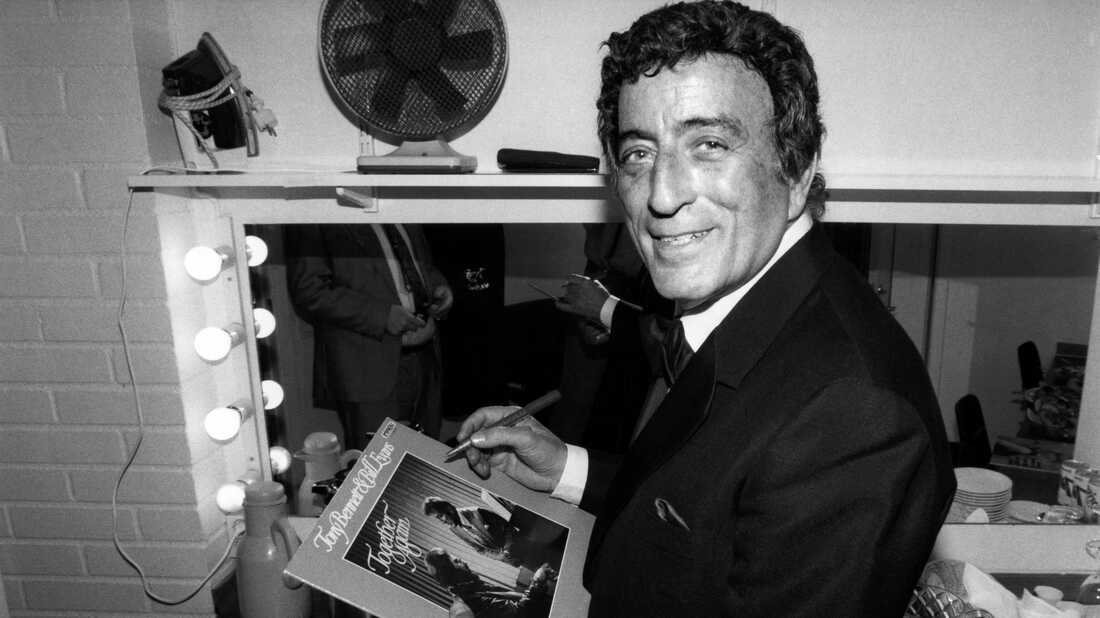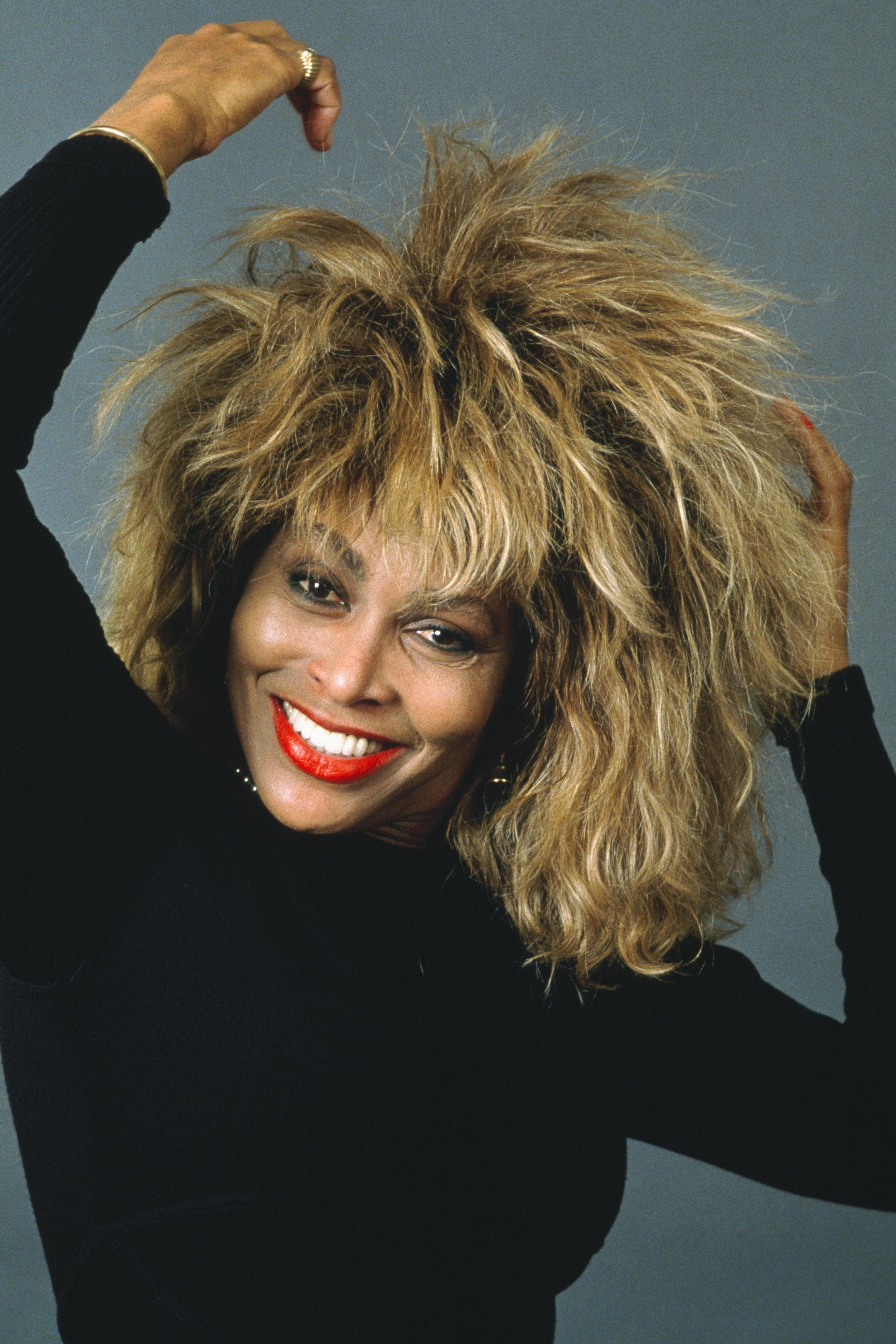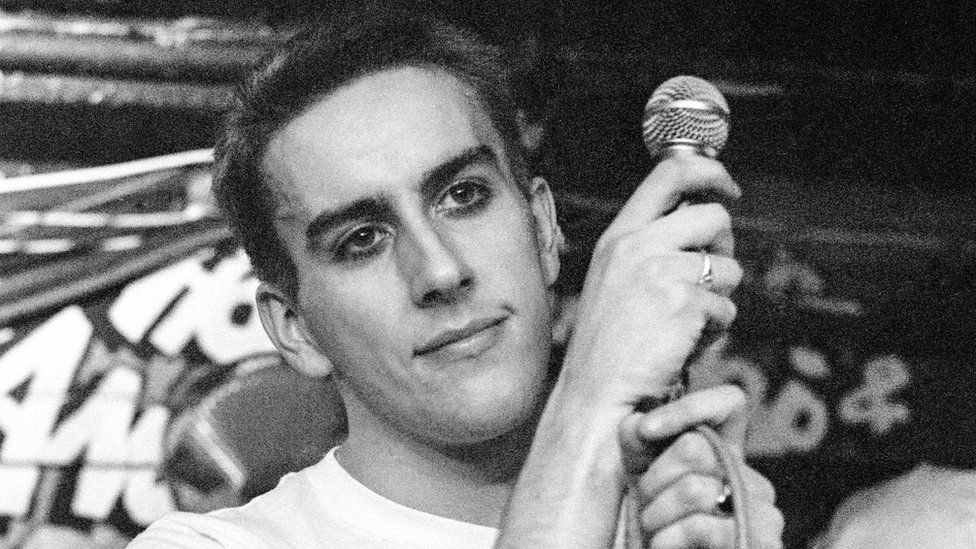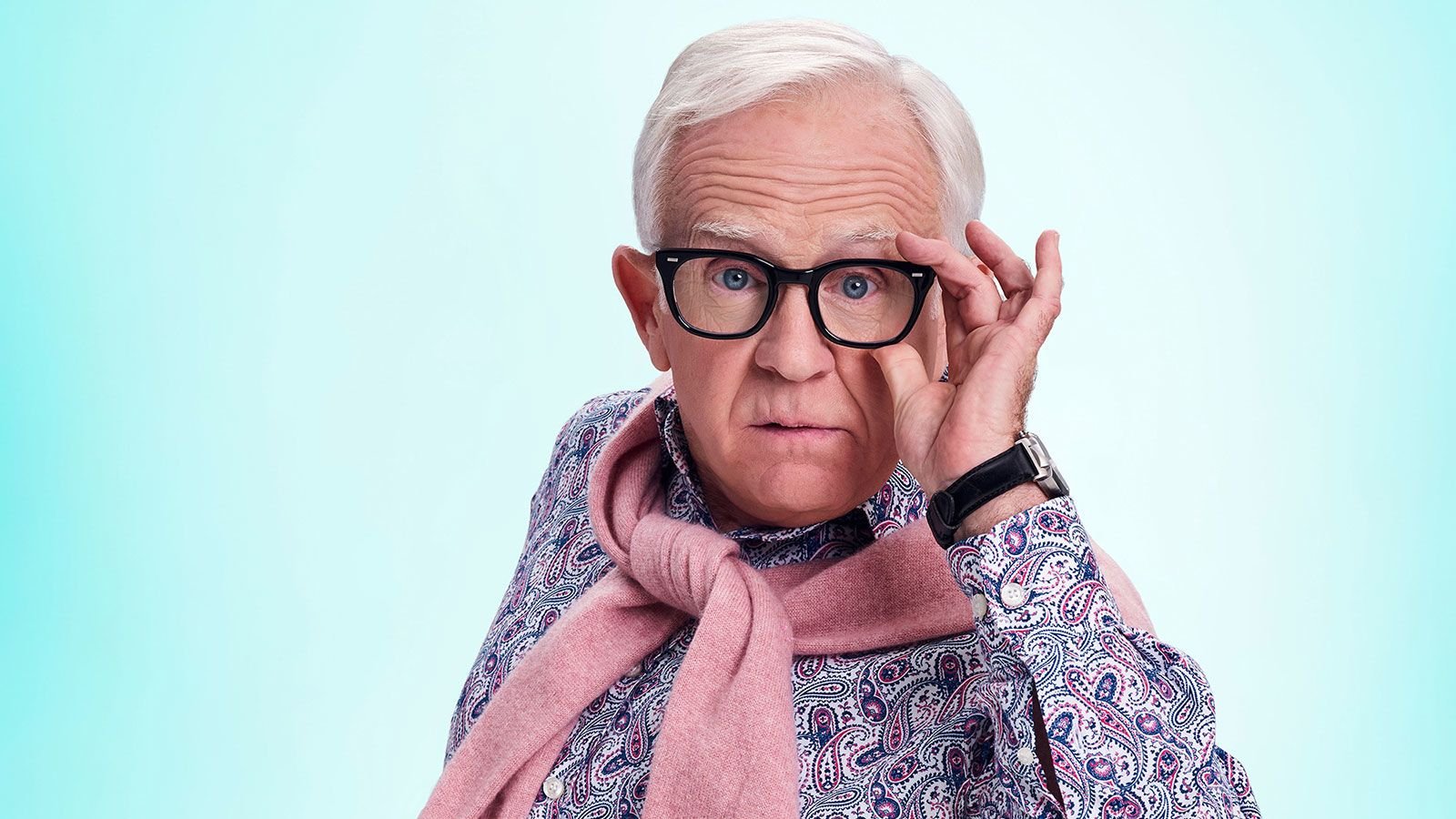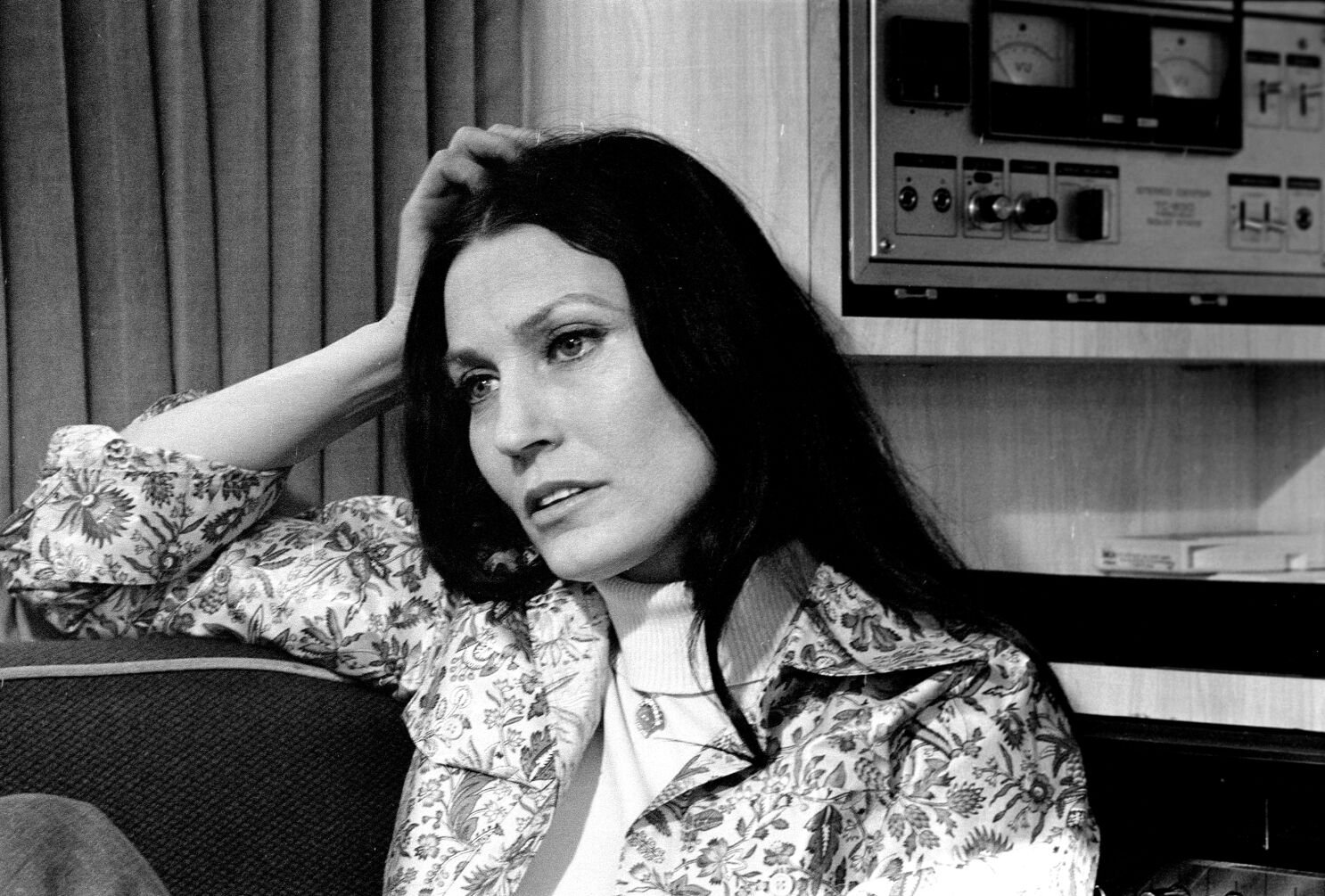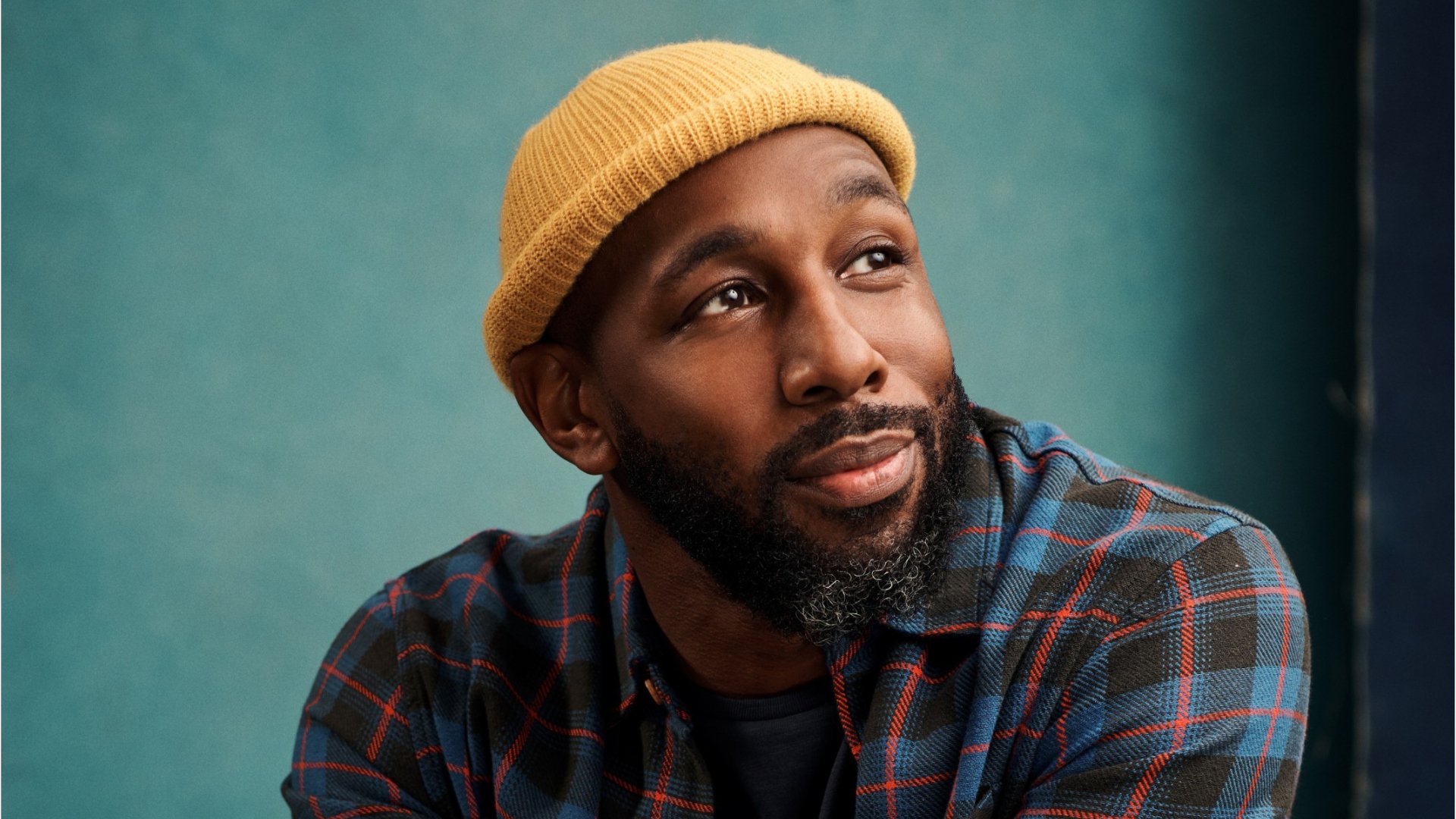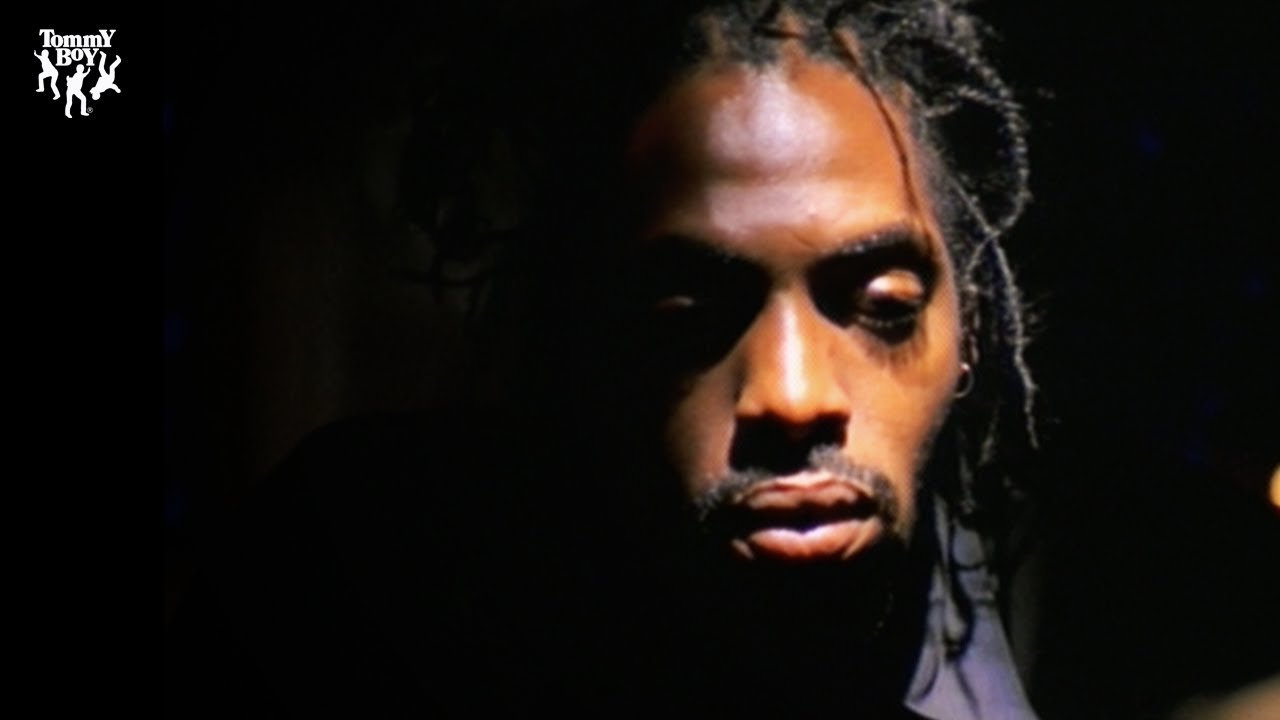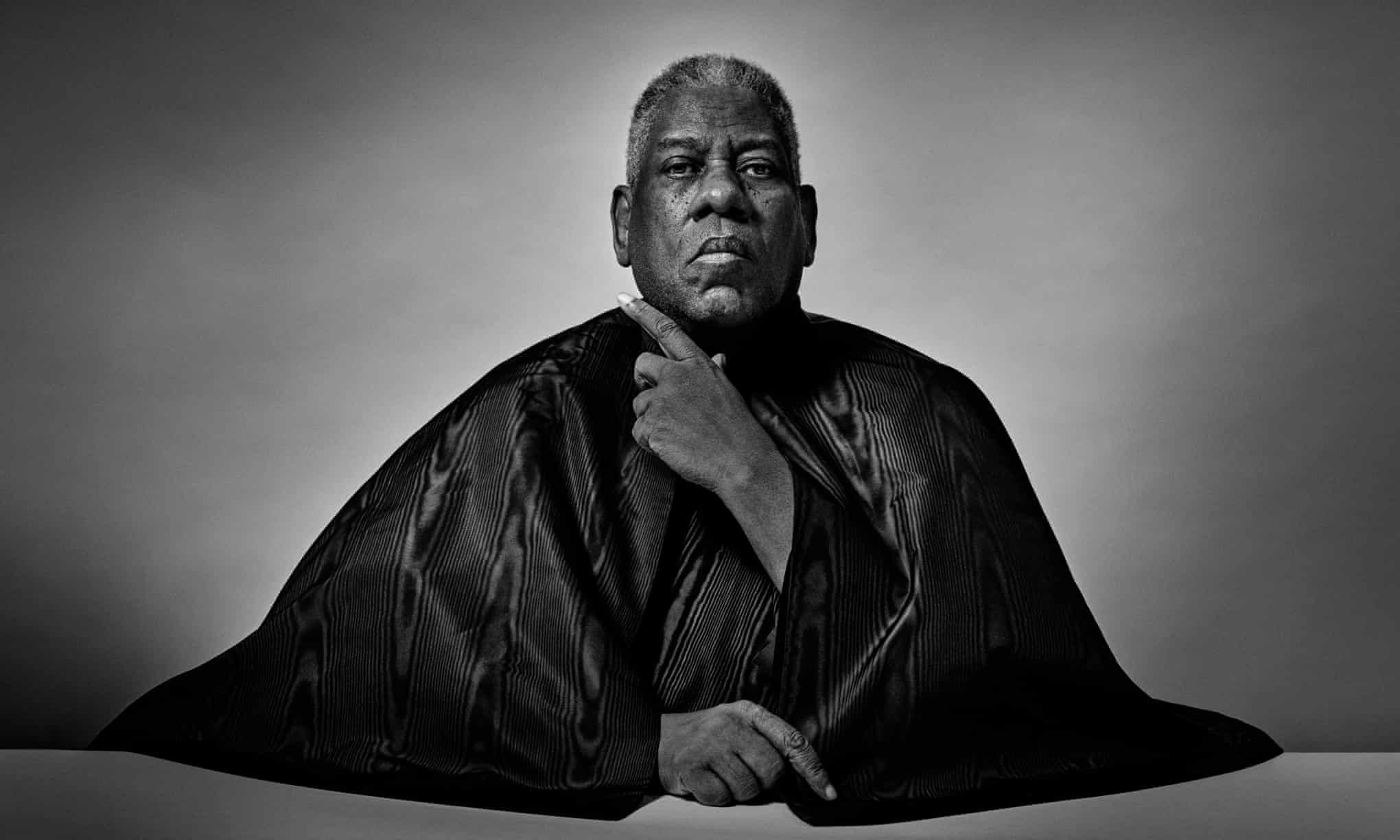The five gates of grief & national grief-in-public day
Yes, yes, I know that I just wrote about another national XYZ day — but these are both very very good.
National Grief-In-Public Day 4/28
On this day of communal mourning, we acknowledge the global crisis of grief, magnified by atrocities such as genocide, environmental degradation, and the dismantling of oppressive systems like colonialism and capitalism. Despite these profound losses, there exists a pervasive denial of our collective sorrow. It is time to offer our communities an alternative path.
As a coalition of those who work with death, we cultivate transformative movements that challenge this denial. Through creating spaces of sanctuary and validation, we provide avenues for shared mourning. By joining our efforts, we have the potential to ignite a profound awakening to the reality of grief.
Here are some suggestions for activities on Annual Grief-in-Public Day:
Establish a station where individuals can pen their grief and attach their notes to a tree branch, allowing them to flutter in the breeze as symbols of remembrance.
Arrange a table adorned with tea light candles, inviting participants to light a candle in honor of their sorrow.
Place a bell on display with a sign prompting individuals to ring it upon recognizing our collective grief.
For those unable to gather in person, consider hosting a virtual "Grief-in-Public Day" event, extending an invitation to your community to join in an online space.
You can see a video from the originator of this idea, my friend and colleague, Narinder Bazen: https://www.instagram.com/reel/C5yJqBpOqwX/?utm_source=ig_web_copy_link&igsh=MzRlODBiNWFlZA==
The official website is here: https://annualgriefinpublicday.my.canva.site/
The Five Gates of Grief | Event 4/28-4/30
“So much in this world needs our attention. So much is threatened and clinging perilously close to the edge of existence. We know this is true. Grief is our witness to these painful realities. Grief is also our response that confirms our intimate bond with all creation.” ~ Francis Weller
Last year we of Salt Trails Collective reclaimed Love Park as a space not only for love but for grief with Revolutionary Grief, Revolutionary Love.
In 2022, we sat on a bench in the Wissahickon inviting passersby to share their grief with us.
This year, in collaboration with @thresholdcollective_ and funded by a @leewayfound grant, we are presenting the Five Gates of Grief, inspired by the work of psychotherapist and soul activist Francis Weller.
On April 28th, 2024 at 4pm, Threshold Collective and Salt Trails with The Maas Building will be hosting a free and public arts event based on The Five Gates of Grief - access points to grief that all humans experience throughout our lives as described by author Francis Weller. This event was made possible by a grant from The Leeway Foundation to whom we are immensely grateful.
On 4/28/24 at 4 pm there will be a live activation of the three day installation, and the artists below will be doing live performance at each gate. Please join us!
Remember that there are many ways to show up for this day even if your work is not rooted in death and grief. To be alive on this planet at this time is to be a grief pilgrim, and this is an open call to anyone who’d like to be part of weaving a collective container to help hold the griefs in their community.
If you’re more of a listener than a reader, you might also enjoy this podcast with my friends Narinder and Naila: https://shows.acast.com/nine-keys/episodes/grieving-in-public-with-naila-francis
National Healthcare Decisions Day
National Healthcare Decisions Day (NHDD) exists to inspire, educate and empower the public and providers about the importance of advance care planning.
NHDD is an initiative of The Conversation Project, and is designed to encourage patients to express their wishes regarding healthcare and for providers and facilities to respect those wishes, whatever they may be.
82% of people say it’s important to put their wishes into writing.
But only 23% have actually done it.
80% of people say that if seriously ill, they would want to talk to their doctor about wishes for medical treatment toward the end of their life.
But only 7% report having had this conversation with their doctor.
If you were unable to speak for yourself, what would be most important for your friends, family, and physicians to know?
The key goal of NHDD is to change these statistics by demystifying healthcare decision-making and making the topic of advance care planning unavoidable. Advance care planning is more than a living will, but starts with conversations and should involve choosing a healthcare agent. Furthermore, advance care planning is for everyone, at any (or no) disease stage. NHDD encourages all of us to have conversations before crisis and to begin to see advance care planning as a gift we can give to our loved ones and future selves.
What’s a healthcare agent?
A healthcare agent is a person you choose in advance to make healthcare decisions for you in the event that you become unable to do so. Here’s a quick (and amusing) video about choosing the best healthcare agent for you.
What’s a living will?
Sometimes called a personal directive, advance directive, or medical directive, a living will is a legal document in which you specify what actions should or should not be taken for your health in the case you are no longer able to make decisions for yourself. There are many, many different forms of living will, some several pages long and some as short as two.
Where do I start?
I’m so glad you’re ready to get started! You can check out some resources online with The Conversation Project’s Starter Kit — or visit us in the one of the local events happening in your city. Search here. You can also work with a local death doula if you’d like someone to walk you through the process.
What questions do you have about advance care planning?
Have you had conversations about you and your loved ones’ wishes? What went well with those conversations, and what would you do differently if you had to do it again?
If you have done your advance care planning, how did you feel afterward? If you have not, what feelings seem like a barrier to completing them?
What advice would you give to others who are about to start having these conversations? What advice would you give your past self?
Grief anniversaries
Psychological literature calls it ‘the anniversary reaction’ and defines it as an individual's response to unresolved grief resulting from significant losses. The anniversary reaction can involve several days or even weeks of anxiety, anger, nightmares, flashbacks, depression, or fear.
Most grievers I have worked with or spoken to experience some kind of reaction to the dates they associate with their grief. This is not limited to the date of death or an incident, but may also include the person’s birthday, another special holiday, the date of memorial — or something else entirely. All that matters is the significance that you, the griever, assigns. Many times this comes up in a subtle way that we might not even notice. It can arise as general malaise, moodiness, increased irritability, or sleep disturbances. Once we recognize what is going on, sometimes the naming is what matters most. “Oh, this is my grief. Ok, I know what to do with this now.” But sometimes, we’re lost as to what to do… how to recognize or mark the passage of time is complicated, can be confusing, and is as unique as your grief.
I encourage grievers to try to be flexible above all. If you want to make a plan, great. But consider what your plan B and C might be if something doesn’t work out, or you feel differently than expected. There is no ‘wrong’ way to spend an anniversary, up to and including pretending it doesn’t exist at all.
Some other ideas to consider:
Visiting their graveside (if they have one) or another important place
Journaling about your relationship, your memories, and your grief
Write them a letter with everything you’d like to say
Create or revisit a memory box or altar; cleaning and reorganizing these spaces can be deeply meaningful
Do something they loved to do, like cook a special recipe, go for a hike, play a sport or game, visit a beloved restaurant or bar
Spend time with family or friends — or bookmark time alone
Remember that anger, anxiety, and other uncomfortable feelings can be part of grief, too
Volunteer with an organization that was important or relevant to your person — an animal rescue for an animal lover, a street clean-up in their neighborhood, or an organization associated with their illness like the Alzheimer’s Association, etc.
Consider booking the time off of work and other responsibilities
Locate a grief ritual in your community
Sometimes having a plan can create space for feeling — sometimes it fills us with dread and overwhelm. Use those internal emotions to help direct you, and trust that listening to them will not steer you wrong. Our relationship to anniversaries can change over time, so while tradition is beautiful and meaningful, don’t feel pressured to develop The Tradition immediately. It will emerge over time. Likewise, if a tradition is no longer feeling ‘right,’ it may be time for evolution or reinvention. If you’re having trouble knowing where to start, pull in a trusted friend, a therapist, or a death doula. Start small.
How have you spent your grief anniversaries? Are you pleased with how they have gone thus far, or do they need reinvention?
What scares you about anniversaries? Is there anything that you like about them?
Who has been most supportive to you on grief anniversaries? Have you received sufficient support, or would it feel nice to recruit a few more allies?
More reading:
Anniversary Reactions are Deeply Personal
Anniversary Effect: What it is and how to cope
Journaling prompts for anxiety
I know, I know, a therapist who suggests journaling. How unique! Journaling is not for everyone — no intervention is one sized fits all — but these questions can be a beautiful place to start exploring your emotional processes. I suggest setting the scene: get comfortable physically, open a new document and/or crack open a notebook, light a candle or a stick of incense, and see what comes out on the page. There is something special and important about externalizing your experience, getting it out of your head.
Imagine a miracle happened and you woke up one day with a new life, what would be different? What would stay the same? What are you unsure about?
Write a letter to the person who causes you the most anxiety. Tell them why they cause you anxiety, but don’t send it to them.
What is the biggest life lesson you’ve learned to date? How did you learn it and how has it affected your life?
What are your thoughts about the following statement: “anxiety stems from our desire to control things that we cannot.”
Make two columns. In the 1st column, write down five things you fear and in the 2nd column, explain why those fears are valid.
Write a letter to your 10-year-old self. How would you encourage them?
What is a quality that you admire most about others? In what way do you see this quality in yourself?
Choose an Inspiration Word for the week. What does it mean to you? And how can you live your life this week with that word in mind?
Write yourself a letter forgiving you for something that has happened in your past.
What is one thing you wish you had said no to? Why didn’t you? What impact did it have on your experience?
Ambiguous loss, disenfranchised grief, secondary losses, oh my!
That’s a lot of words, I know. Please bear with me. Terminology is dear to me because naming things matters and I have a love for words. Validating our experiences with a name (of our own choosing or one developed by ‘professionals, it doesn’t matter) can help us to endure the process in a different way… Perhaps a more grounded way.
Ambiguous loss is the experience of grieving someone who is still alive. I don’t know about you, but when I experience a break-up, the person I want to speak to the most is the exact person I am supposed to be pulling away from or who is pulling away from me. The human who was previously “our person” may look and sound vastly different from the way we previously understood them. They may lash out, hurt us in ways they had promised never to or in ways we never anticipated. At the very least, they cannot show up for us in the same ways they would have previously.
Reading: https://www.ambiguousloss.com/
Podcast: https://onbeing.org/programs/pauline-boss-navigating-loss-without-closure/
Video: https://www.youtube.com/watch?v=uHFq6v8AiOo&ab_channel=TEDxTalks
Disenfranchised grief refers to the experience of being told, overtly or subtly, that one does not have a ‘right’ to grieve. When societal or cultural norms, or even messages from our smaller community, dictate that we are not entitled to feel the way that we feel, the grief process may be disenfranchised. For example, if you’ve experienced a break-up and all of your friends are busy saying how big of an arsehole your ex was, how much better off you are now, plenty of fish in the sea, etc. — one might interpret those messages as not having a ‘right’ to feel sad or grieve the loss of that person, no matter how right the ending may be. Another example might be within the non-monogamous community. Monogamous friends and family might think or even say, “Well, you have other partners, why be sad about this one?”
Podcast: https://www.coachingwithkrista.com/disenfranchised-grief/
Video: https://www.bath.ac.uk/campaigns/disenfranchised-death-and-grief-today/
Secondary losses can be tangible or more esoteric. While the loss of the relationship itself is primary, we might have to move out of our home, re-examine our finances, grieve time with a shared pet, or lose shared rituals. Break-ups can also bring up feelings of loss of identity, loss of a friend group, or the loss of the future we imagined with this person as our partner.
Now that you know the words, or have received a refresher, I invite you to consider how these experiences have shown up in your own life as well as those you love. How have you handled it in the past? How might you like to handle it differently in the future? Does this change how you view your current or past grief processes?
What is scanxiety?
All patients have complicated relationships with their scans not unlike the hate-love relationships we have with other technologies in our lives. We first learn we have cancer from scans, then learn from them if that cancer has shrunk or disappeared, then learn if it has come back. Scans are like revolving doors, emotional roulette wheels that spin us around for a few days and spit us out the other side. Land on red, we’re in for another trip to Cancerland; land on black, we have a few more months of freedom.
— Excerpt from “Scanxiety” by Bruce Feiler (link below).
Tips to manage scanxiety
Give yourself permission to feel scared or angry; acknowledge your feelings. You might get short with people. You might be more tearful than usual. You might be someone who shuts down. Acknowledge what’s going on, take it for what it is, and be gentle with yourself.
Join a support group. There are both in-person and online options to meet your schedule and preference. Talking to others who understand what you’re going through can be extremely helpful! Ask your oncology social worker for a referral or peruse the Cancer Support Community’s calendar.
Distract yourself with enjoyable activities. Watch TV, read a book, go somewhere fun. Cognitive-behavioralists have shown that adding one pleasurable activity per day can have a huge impact on mindset and mood. Use this evidence-based technique on yourself and reap the benefits of years of research.
Yes, it can sound intimidating. But meditation has proven benefits and you can use it before, during, and after your scans. One key is to remember that meditation is a practice — meaning you won’t do it “perfectly” the first time (or ever). The point is to practice clearing your mind, not to successfully clear your mind. Michigan Medicine has a free guided imagery audio library to check out.
Take advantage of resources. Begin a relationship with one of your cancer center’s psychologists, therapists, or social workers — or talk to your providers about anxiety-reducing medications. It’s not a failure to accept assistance, but a show of strength.
Want more?
Here are some extended readings/listenings on this topic.
You’re the experts
When it comes down to it, you reader are the expert in managing scanxiety! What from this list is something you use? What else have you done to manage your scanxiety that we may have missed? What have others shared with you that really resonated? Share in the comments if you feel so inclined.
Note: there is a version of this article on the internet attributed to another author. I wrote this during my internship at Abramson Cancer Center and it appears that they have chosen to assign authorship to a permanent staff member. However, I am the originator, researcher, and when the blog was on the private internal blog for patience, I was listed as the author. C’est la vie!
Journaling prompts for grief
I know, I know, a therapist who suggests journaling. How unique! Journaling is not for everyone — no intervention is one sized fits all — but these questions can be a beautiful place to start exploring your grief. I suggest setting the scene: get comfortable physically, open a new document and/or crack open a notebook, light a candle or a stick of incense, and see what comes out on the page. There is something special and important about externalizing your experience, getting it out of your head.
What do ‘griefbursts’ or grief attacks look like for you? When and where did you last experience one?
List the secondary losses you are experiencing as a result of our loss. Examples may be related to loss of self (identity, confidence, health, personality), security (emotional, physical, financial, lifestyle), and/or meaning (goals, dreams, faith, joy). Choose one or two and write about them.
How do you feel about the concept of learning to reconcile rather than get over grief?
What is a mantra you can return to when you feel overwhelmed by grief? Where should that mantra be, so that you can access it?
Do you think your gender identity affects your grief? Why/why not?
If you could tell your deceased person about your day, what would you tell them?
If I could forgive them for something, it would be…
I feel most connected to my loved one when…
How have your views of God and spirituality changed since grieving?
How are you discovering transformation by grief?
Grief Etiquette: Please Don't Ask "What Happened?"
Kamala explains why you should think about NOT asking ‘what happened’ following news of a death, celebrity or otherwise.
Rebecca Soffer, the co-author of Modern Loss: Candid Conversation About Grief, states, "If you’re curious about how your friend’s loved one died, but you’re not close enough to already know or ask in person, then asking is prying."
We understand that this may sound or feel harsh to hear. Some deaths are transparent, and some are private and we need to respect each death and each dearly departed soul in a respectful manner according to their own mood and wishes.
This goes doubly when it comes to social media. If a post or statement has gone out on someone's death, then the information already provided is for the public, asking for additional private information during this difficult time is not appropriate.
Appropriate responses to a death on social media are condolences in the comments section, memories, a picture of you and the departed, offering help or lending an ear, or at the very least, a few comforting emojis or reactions.
The following is an excerpt from: Fireflies Unite w/Kea:
“What happened?” is commonly asked, and while I do believe most people are genuine and concerned, asking for the details can come across as insensitive. While you may think it is showing compassion and concern, did you ever stop to ask yourself the following:
How many times is this person repeating that story?
How draining it can be, triggering and re-traumatizing?
Am I entitled to know the specifics of the passing?
Asking for those details does nothing for the conversation. It does not console the person, bring the person back the person who passed away and puts the person in an awkward position to share if they have a hard time saying no. (For more direction on answering these questions and what you should do, check out Ring Theory.)
There have been times when I’ve shared details, and I was not ready, but I did not want to come across as being mean. But wait, why am I concerned about how the other person feels? It appears as if the person is interested in the details of how the person passed without taking a moment to ask how I am doing.
For instance, what if the person said, “my mom jumped off a bridge” or “my sister died from cancer.” What are you doing with this information? Will you be more compassionate if you know the specifics? You can send your condolences and prayers without knowing what happened.
— Post by Kamala Alexandra
The contents of this blog are for informational purposes only and are not intended to be a substitute for professional medical or mental health advice, diagnosis, or treatment. If you or a loved one is having a hard time with grief and loss, please seek out help from a trained medical professional. The information provided on this website or links to others is to be used for educational purposes only. It should NOT be used as a substitute for seeking professional care for the diagnosis and treatment. The information contained herein should be used in conjunction with professional care.
2023 Reading Challenge
We invite you to join our 2023 book reading challenge focused on death, grief, and healing.
Whether you're a seasoned death positive reader looking to boost your knowledge or a newly minted deathling looking to discover a new perspective, this challenge is for anyone who has experienced loss and is looking for comfort, understanding, and support through the written word. Choose your own reading goals and track your progress throughout the year.
Share your thoughts and feelings about the books you read with our community and get personalized recommendations from fellow readers through the #PDDCReadingChallenge hashtag on Instagram. Let's come together and find knowledge, understanding, and comfort through the power of literature.
Please note that the following are simply the first 15 suggested books for some categories. The full list is located here. We also welcome you to comment on the Google Document any books/works that we might have missed.
Caring for the caregiver and/or self-care
A Bittersweet Season: Caring for Our Aging Parents and Ourselves – Jane Gross
Be the Noodle: Fifty ways to be a compassionate, courageous, crazy-good caregiver – Lois Kelly
The Body Is Not an Apology: The Power of Radical Self-Love – Sonya Renee Taylor
Can’t We Talk About Something More Pleasant? – Roz Chast
The Caregiver’s Challenge: Living, Loving, Letting Go – Maryann Schacht
The Color of Care: A Beginner’s Guide for the African American Caregiver – Ky’a Jackson
The Conscious Caregiver: A Mindful Approach to Caring for Your Loved One Without Losing Yourself – Linda Abbit
Living with Dying — Jahnna Beecham and Katie Ortlip
Late Migrations: A Natural History of Love and Loss – Margaret Renkl
Multicultural Guide to Caregiving: Essential resources to help you balance traditions without losing your mind or money – Angelica Herrera Venson
My Two Elaines: Learning, Coping, and Surviving as an Alzheimer’s Caregiver – Martin J. Schreiber
The Self-Compassion Workbook – Joy Johnson
Stillpoint: A Self-Care Playbook for Caregivers to Find Ease, and Time to Breathe, and Reclaim Joy Second Edition – Sheila K. Collins, PHD, Christine Gautreaux, MSW
The Sudden Caregiver: A Roadmap for Resilient Caregiving – Karen Warner Schueler
Why Has Nobody Told Me This Before? – Julie Smith
Fiction - where a death worker is a character
The Next Thing You Know – Jessica Strawser
The Book of Two Ways – Jodi Picoult
Casket Cache – Janice J. Richardson
The Thoughts & Happenings of Wilfred Price, Purveyor of Superior Funerals – Wendy Jones
Wild Oats – Pamela Morsi
Woman of the Dead – Bernhard Aichner
Madam Mortician – Tara Carr
Owl’s Slumber – Nicky James
Cremains of the Day – Misty Simon
Mourning Wood – Heather M. Orgeron
Fun Home: A Family Tragicomic – Allison Bechdel
Putting Makeup on Dead People – Jen Violi
Beneath the Bone Tree – Anne-Marie Keppel
Life Events – Karolina Waclawiak
Dear Edward – Ann Napolitano
Centered around cultural deathways
Las Ceremonias Bonitas, Home Funeral Ceremonies: A primer to honor the dying and the dead with reverence, light-heartedness and grace – Donna Belk & Kateyanne Unullisi
The Buried Treasures Of The Ga: Coffin Art In Ghana – Regula Tschumi
The Tibetan Book of Living and Dying – Sogyal Rinpoche
Anam Cara – John O’Donohue
The American Book of Living and Dying – Richard Groves
From Here to Eternity: Traveling the World to Find the Good Death – Caitlin Doughty
Passed On: African American Mourning Stories – Karla FC Holloway
Killing the Black Body – Dorothy Roberts
Path of Souls: The Native American Death Journey – Gregory Little
No Death, No Fear – Thich Nhat Hanh
Revolutions in Sorrow: The American Experience of Death in Global Perspective – Peter N. Stearns
Chinese American Death Rituals: Respecting the Ancestors – Sue Chung and Priscilla Wegars
Death and the Idea of Mexico – Claudio Lomnitz
The Way of American Death Revisited – Jessica Mitford
Traditions of Death and Burial – Helen Frisby
Written by a deathcare provider
Death Nesting – Anne-Marie Keppel
Die Wise – Stephen Jenkinson
Accompanying The Dying – Deanna Cochran
The Art of Dying Well: A Practical Guide to a Good End of Life – Katy Butler
Holding Space: On Loving, Dying, and Letting Go – Amy Wright Glenn
Sacred Dying: Creating Rituals for Embracing the End of Life – Megory Anderson
Reimagining Death – Lucinda Herring
Peaceful Passages – Janet Wehr RN
A Beginner’s Guide to the End: Practical advice for living life and facing death – Shoshana Berger & B.J. Miller
The Five Invitations: Discovering what death can teach us about living fully – Frank Ostaseski
The Best Care Possible: A Physician’s Quest to Transform Care Through the End of Life – Ira Byock
That Good Night: Life and Medicine in the Eleventh Hour – Sunita Puri
Caring for the Dying: The Doula Approach to a Meaningful Death – Henry Ferko-Weiss
Being with Dying: Cultivating Compassion and Fearlessness in the Presence of Death – Joan Halifax
The Green Reaper: Memoirs of an Eco-Mortician – Elizabeth Fournier
A work of thanatology or the psychology of grief
Signs: The Secret Language of the Universe – Laura Lynne Jackson
Maybe You Should Talk to Someone – Lori Gottlieb
The Wild Edge of Sorrow – Francis Weller
Dead Girls: Essays on Surviving an American Obsession – Alice Bolin
Grief is a Journey: Finding Your Path Through Loss – Kenneth Doka
Ambiguous Loss: Learning to Live with Unresolved Grief – Pauline Boss
Grief, Dying, & Death – Therese Rando
Grief Works: Stories of Life, Death and Surviving – Julia Samuel
Western Attitudes Toward Death: from the Middle Ages to the Present – Phillipe Aries
Death, Dying and Grief in an Online Universe – Carla Sofka
The Denial of Death – Ernest Becker
The Worm at the Core – Sheldon Solomon
Finding Meaning: The Sixth Stage of Grief – David Kessler
Philosophy and Death: Introductory Readings – Robert J. Stainton
Handbook of Thanatology: The Essential Body of Knowledge for the Study of Death, Dying, and Bereavement – David Meagher & David Balk
About the physical process of dying
Gone From My Sight: The Dying Experience by Barbara Karnes
Hospice & Palliative Care Handbook: Third Edition – Tina M. Marrelli
The Corpse: A History – Christine Quigley
Compassionate Person-Centered Care for the Dying – Bonnie Freeman
Anatomy of an Illness as Perceived by the Patient – Norman Cousins
Extreme Measures: Finding a better path to the end of life – Jessica Zitter MD
Advice for Future Corpses (and Those Who Love Them) – Sallie Tisdale
Final Gifts: Understanding the special awareness, needs, and communications of the dying – Maggie Callanan
Knocking On Heaven’s Door – Katy Butler
The Conversation: A Revolutionary Plan for End-of-Life Care – Angelo E. Volandes
How We Die: Reflections of Life's Final Chapter – Sherwin B. Nuland
Stiff: The Curious Lives of Human Cadavers – Mary Roach
Modern Death: How Medicine Changed the End of Life – Haider Warraich
Death’s Acre: Inside the Legendary Forensic Lab the Body Farm Where the Dead Do Tell Tales – William M. Bass
The Emperor of All Maladies: A Biography of Cancer – Siddhartha Mukherjee
Written by a dying person
The Unwinding of the Miracle – Julie Yip Williams
When Breath Becomes Air – Paul Kalanithi
Being Mortal – Atul Gawande
Proof of Heaven: A neurosurgeon’s journey into the afterlife – Eben Alexander
Drop by Drop – Judy Croome
Dying: A Memoir – Cory Taylor
The Undying – Anne Boyer
Everything Happens for a Reason: And Other Lies I’ve Loved – Kate Bowler
Salt In My Soul: An Unfinished Life – Mallory Smith
The Bright Hour: A Memoir of Living and Dying – Nina Riggs
Napkin Notes – Garth Callaghan
Until I Say Goodbye: My Year of Living With Joy – Susan Spencer-Wendel
The Cancer Journals – Audre Lorde
The End of Your Life Book Club – Will Schwalbe
The Crossover Experience: Life After Death / A New Perspective – DJ Kadagian
Fiction - where death is a character
Mort – Terry Pratchett
The Book Thief – Markus Zusak
Gods of Jade and Shadow – Silvia Moreno-Garcia
Death with Interruptions – Jose Saramago
Grave Mercy – Robin LaFevers
A Dirty Job – Christopher Moore
On a Pale Horse – Piers Anthony
Deathless – Catherynne M. Valente
The Company of Death – Elisa Hansen
The Tiger's Wife – Téa Obreht
The End Specialist – Drew Magary
A Semi-Definitive List of Worst Nightmares – Krystal Sutherland
My Soul to Take – Rachel Vincent
Inbetween – Tara A. Fuller
Croak – Gina Damico
A queered death-related perspective
LGTBQ-Inclusive Hospice and Palliative Care – Kimberly Acquaviva
it was never going to be ok – jaye simpson
You Better Be Lightning – Andrea Gibson
Grief Map – Sarah Hahn Campbell
The Light Streamed Beneath It: A Memoir of Grief and Celebration – Shawn Hitchins
No Proper Grief: A journey of loss & resilience – Jakob Franzen
A Quilt for David – Steven Reigns
Queer Necropolitics – Edited By Jin Haritaworn, Adi Kuntsman, Silvia Posocco
Angels in America — Tony Kushner (stage play)
Under the Whispering Door – TJ Klune
Queering Acts of Mourning in the Aftermath of Argentina's Dictatorship: The Performances of Blood – Cecilia Sosa
Rebellious Mourning: The Collective Work of Grief – Cindy Milstein, ed.
The Dark Eclipse – A.W. Barnes
Contemplative Caregiving: Finding Healing, Compassion, and Spiritual Growth Through End-of-Life Care – John Eric Baugher
Partnered Grief: When Gay and Lesbian Partners Grieve Paperback – Harold Ivan Smith & Joy Johnson
Written by a griever
A Very Easy Death – Simone de Beauvoir
Men We Reaped: A Memoir – Jesmyn Ward
The Way Through the Woods – Long Litt Woon
The Year of Magical Thinking – Joan Didion
Crying in H Mary – Michelle Zauner
From Scratch: A Memoir of Love, Sicily, and Finding Home – Tembi Locke
Shattered by Grief: Picking Up the Pieces to Become Whole Again – Claudia Coenen
Let’s Take the Long Way Home – Gail Caldwell
The Long Goodbye – Meghan O’Rourke
The Mercy Papers – Robin Romm
The Iceberg – Marion Coutts
I'm Glad My Mom Died – Jennette McCurdy
Sweet Sorrow – Mark Wakely
Grief Healed: A Physician's Guide to Dealing with Grief and Thriving – Sona Bhatnagar
Driven: A White-Knuckled Ride to Heartbreak and Back – Melissa Stephenson
Death care / grief care academic journal
OMEGA - Journal of Death and Dying
Death Studies Journal
The Collective for Radical Death Studies Canon (see website)
lambda nordica
Journal of Pain and Symptom Management
Markers – the scholarly journal of the Association for Gravestone Studies
Thanatological Studies
Whatever. A Transdisciplinary Journal of Queer Theories and Studies; Queer thanatologies issue summer 2021.
Illness Crisis & Loss: SAGE Journals
Journal of Loss and Trauma
Journal of Personal and Interpersonal Loss
Mortality
Journal of Historical Sociology (selected issues)
Progress in Palliative Care
Readings in Aging and Death: A Contemporary Perspective
A book about ethical wills
For You When I Am Gone: A Journal: A Step-By-Step Guide to Writing Your Ethical Will – Steve Leder
Ethical Wills: Putting Your Values on Paper – Barry K. Baines
Ethical Wills: A Modern Jewish Treasury – Jack Reimer & Nathaniel Stampfer
Written by and about PGM grieving and dying
Passed On: African American Mourning Stories – Karla FC Holloway
Killing the Black Body – Dorothy Roberts
Grieving While Black: An antiracist take on oppression and sorrow – Breeshia Wade
Dear Memory: Letters on writing, silence, and grief – Victoria Chang
The World Keeps Ending, and the World Goes On – Franny Choi
Postcolonial Grief: The afterlives of the Pacific Wars in the Americas – Jinah Kim
One Long Listening: A memoir of grief, friendship, and spiritual care – Chenxing Han
Time Is a Mother – Ocean Vuong
Black Grief / White Grievance: The Politics of Loss – Juliet Hooker
Grief Is Love: Living with loss – Marisa Renee Lee
Black Widow – Leslie Gray Streeter
Way of Wakan: Reflections on Lakota spirituality and grief – David J. Mathieu
Spirit Matters: White Clay, Red Exits, Distant Others – Gordon Henry
Race & the Funeral Profession: What Jessica Mitford Missed – Kami Fletcher
The Pain We Carry: Healing from Complex PTSD for People of Color – Natalie Y. Gutiérrez LMFT
Why celebrity deaths hit us so hard
When a celebrity dies, there is this great loss felt by many. When they pass away, it isn't just their family and friends who mourn their loss; all their admirers do as well, even if they never met or saw this person in real life. What is it about celebrity deaths that affect us so much? There are a few factors why we feel this way.
A Parasocial Bond
Parasocial bonds are "one-way" celebrity relationships in which many individuals feel highly linked to actors, artists, musicians, and others despite the fact that they have never met them. Parasocial bonds are actually normal and many of us have them. Celebrities can feel like our long-time childhood friends. Truly deep down, we know celebrities aren't our "real friends" rationally, but because we see them so frequently and have so much knowledge about them, it does feel like a real friend, and for some of us, celebrity parasocial bonds are more constant than real-life relationships; they never go anywhere and they never leave us. This is why when they achieve amazing things, we want to be proud of and connected to them. But it also means that when they become ill or die, we grieve for them as if we just lost a dear friend.
The Nostalgia Factor
One can mourn the loss of a celebrity simply for nostalgic reasons too; the mere memory of a character they played can bring up such specific memories and times in our lives. These characters become a part of who we are as a result of nostalgic reflection, even those with whom they had no parasocial connection. We identify with a protagonist they played in the past, they feel like such a big part of our own character development and as a result, when they die, we may feel as though we have lost a piece of ourselves.
The Realization of Impermanence
When a celebrity, especially one who has always been a constant, dies, it reminds us of our own mortality and the impermanence of material life. This is twofold for the fan; it reminds us that everything in the material world is finite and temporary, and it also reminds us of our own mortality. According to terror management theory, most people have a fear of death, which we largely handle by avoiding and not thinking about it. So when something (like the death of a beloved comedian) pushes our own mortality into our minds, it can be shocking to our systems. It is a reminder of our own aging and death.
When A Celebrity Dies, it Makes us feel like "Everyone is Dying"
Celebrity deaths are upsetting because just a few deaths can make it appear as if everyone around us is passing away. Some say this is due to the availability heuristic; the more easily we can think of examples of something, the more we assume that it happens a lot. Some examples of availability heuristics are plane crashes, shark attacks, etc. The probability is actually rare, but our mind makes a shortcut that relies on immediate examples that form an opinion on the outcome. How many times have you seen two celebrities die a month apart and hear people say "A third one is coming", and guess what? The truth is, yes, one is coming, but that is because celebrities are people and people die every day.
Grief is Love
Lastly, I want to remind everyone as we grieve for the ones we loved and care about, your grief is a true sign of your love and affection for someone. I try to always remind people that their emotions and feelings around grief are normal and valid, no matter how chaotic they may feel at the time. Just because you can’t explain your grief or your friends and family don't understand it, doesn’t mean your feelings aren’t valid. Don't marginalize your own grief after a celebrity you cared about dies, you have every right to be sad and miss them. It might be helpful to think of it as a high form of praise. You enjoyed their work, a craft they worked their whole life to perfect. You mourning their departure and the tears you shed, are the highest form of flattery and best compliment you can give them on a job well done.
If you’re one of the many fans struggling to come to terms with this week’s sad news, or you have found it challenging to cope with one of the recent celebrity deaths, please feel free to contact me. The information provided on this website or links to others is to be used for educational purposes only. It should NOT be used as a substitute for seeking professional care for diagnosis or treatment. This information should be used in conjunction with professional care.
Written by Kamala Alexandra.
Rituals for hard holidays
First things first, I’d like to acknowledge that so-called Thanksgiving is based in colonialism and genocide. Our family of origin — and for that matter, you, dear reader — may or may not be on the same page with this understanding. I’m going to focus on how to get through the day with grief — and I hope that can include survival with a decolonized lens. As a white settler on occupied land, however, I cannot claim expertise or advanced knowledge of decolonization. It’s a journey I am still on myself… as I am on my grief journey alongside yours. May we do so together in strength and solidarity and continued learning.
Whether it’s your first holiday season or your fifteenth, this can be a trying time for grievers. If you feel inclined to skip the whole thing, let this writing be your permission. You are not required to celebrate.
But let’s say that you do want to celebrate, but are unsure how. One way to include your dead person(s) is through ritual. These rituals can be collective or individual, or a combination of the two. While it can feel awkward to invite others to join us in ritual, especially new ones, awkwardness in my opinion in no way takes away from the potential power and importance. If it’s your first time considering such a thing, I invite you to lean into the discomfort and see the beauty in the asking.
Beginning ideas for developing ritual:
Consider food. What recipes, flavors, or foodways were important to or remind you of your person? Is there a way you can integrate those foods into your celebration, even if an original recipe has been lost or the preparation is complicated? Are there cultural or ancestral ties that could be nurtured and acknowledged?
Example: my German-English grandmother always made Springerle cookies and I try to make them for our holiday meals. The stodginess of shortbread reminds me of her demeanor, while their sweetness brings forth her way of showing love through baked goods.
Consider an altar. What is a table set for loved ones to dine next to one another but an altar? A table setting is, after all, every day ritual… And holiday tables can be special, with flowers, fabrics, or candles. How can you bring meaning to the table as well? That can be as simple as an image of your person, their favorite plant or flower, a meaningful stone or shell, or saying a few words in their honor prior to lighting said flames.
If you have candles on your table, consider the following prayer before lighting them: We light a candle to honor our grief and give thanks for the lives of our loved ones. May this light guide us forward toward healing and peace and bring them to the table for this holiday.
Consider taking a moment to journal, externalizing your thoughts and feelings by taking them outside your own head and heart, which may help release the pressure of bottling them up inside. Prompts to consider:
The changes I’ve gone through in my grief include…
The losses I want to honor this holiday season include…
I can honor those losses by…
Write a letter to pre- and during-grief self, acknowledging all the hard things you went through
Write a letter to the “ghosts” of the year previous: the things you wished happened but weren’t able to. What did you hope to get from them? How would your year have been different if those things had happened?
Write a care plan for 2023: how will you tend to the wounds left from the grief & loss you’ve experienced? How will you tend to your emotional health? How will you honor your grieving process?
What traditions will you miss this year? Is there any way to honor those traditions in another way?
What is one thing you can look forward to (however small) this upcoming holiday season?
Who is one person who has helped you manage stress, sorrow, etc. this year?
How have you grown closer to the person that you want to be over the last year?
Think about what you’ve been most grateful for in 2022. How can you increase the presence of those people, things, events, etc. in your life in 2023?
Other remembrance activity ideas:
Set a seat at the dinner table and leave it empty in honor of your loved one’s memory. Perhaps include their image, make them a plate, or pour their favorite drink.
Toast your loved one and ask those who wish to share favorite memories of their person or people who aren’t able to be physically present.
Ask everyone to write down their favorite memories of your loved one, which they place into a memory box, opening it at a designated time, perhaps even reading each memory aloud.
Create a memory tablecloth, asking guests to use markers to document upon it their holiday memories, especially those having to do with loved ones who have died.
Donate to a charity in your loved one’s memory.
Incorporate a moment of silence before, during, or after your meal, asking folks to pause to remember and give thanks for the love of those not present due to death, or other reasons.
Give yourself permission to say your loved one’s name and bring up stories about them, or discuss how much you miss them. Allow yourself to feel the support and love of your family and friends.
Start a new tradition. Instead of staying home, consider travel for the holiday, or instead of cooking a huge Thanksgiving dinner, begin a tradition of dining at your (or your loved one’s) favorite restaurant.
Watch a movie (or sports team) your loved one enjoyed, complete with popcorn and a toast with their preferred beverage.
Take a family outing to a place your loved one found special, using the time to reflect upon their memory either alone, or as a family. This could be a park, the cemetery, their favorite vista / hiking spot, or even something they drove by often that was meaningful.
Invite your family and friends to take part in a volunteer activity in memory of your loved one. Example: clean cages at an animal rescue or volunteer to serve meals at a mission for unhoused folks.
More readings and many of the these bullet points were taken from Full Circle GC.
More readings on the holidays and grief that I recommend are available here:
Thanksgiving Tips for Grievers - What’s Your Grief
You Don’t Have to Fake It Through Thanksgiving - NYT
A Mindful Approach to the First Thanksgiving with Grief - Heather Stang
Missing a Loved One on Thanksgiving - Eterneva
Do you have any tips or tricks for getting through the holiday? What is your plan for this year (if you have one)? Please share in the comments.
Questions Death Doulas Ask
Lori was delighted to be asked by the folks at Mindful Magazine to write an article based on her TikTok series, Questions Death Doulas Ask. You can find the original article here: https://www.mindful.org/6-mindful-questions-to-ask-yourself-about-death-and-dying/
Facing the reality of death—whether our own or a loved one’s—can be deeply painful. Yet, many find more ease once they accept that death is a part of life. These prompts can help us ease in, lessen anxiety, and maybe even feel a little more prepared.
“What the heck is a death doula!?” It’s a question I’ve gotten in bars, Ubers, public parks, and via telehealth platforms—essentially, whenever I tell people what I do. And I admit—it’s a question I love answering, because death doulas address a universal need. Every person eventually faces the fact of death and dying, whether we lose a loved one, are faced with a terminal diagnosis, or feel anxious about end-of-life. This is where death doulas can help.
What is a Death Doula?
A death doula is a non-medical support person who serves a dying individual, their loved ones, and/or their caregivers. Prior to medicalization and the emergence of professionalized death care, most people died at home where members of their community or family would tend to them and serve as a peaceful presence. Many people today state they want to be at home, but instead die in hospital beds, their caregivers unequipped to meet their needs or feeling incapable, intimidated, or overwhelmed. Death doulas can be part of the team that makes dignified home deaths possible. (Though we work anywhere we are welcome!)
We answer questions, ease anxieties, serve as guides, and advocate for autonomy and dignity. And death doulas aren’t only for the imminently dying. We assist people in all stages of life with advance care planning, resolving death anxiety, supporting grief, education and social justice activism, and other related issues. Death doulas tend to be a flexible, curious, and present bunch—if there’s a need, we’re going to try to anticipate it, and if we’re not the ones to fill it, we’ll find the right person for the job. Whether you’re caring for sick elders, wrapping your head around your own end, or grappling with a chronic or life-limiting illness and its ramifications, there’s a good chance that a death doula’s services could be of use to you.
6 Questions a Death Doula May Ask
In a society where we often struggle with facing end of life issues head on, death doulas ask questions that others might not think or know to ask…
What sounds would you like to hear during your dying process? Would you like it to be quiet, or would you like ambient sound? Perhaps you like rock music. Would you like conversation to happen around you, or would you prefer peaceful contemplation?
What is a memory that brings you strength, or showed you your own strength? When in your life did you feel most strong and capable?
If you died today, what would you want your epitaph to be? If you don’t want an epitaph, perhaps consider what sort of ‘closing statement’ you would like about your life and legacy.
Is there something you’ve always wondered or wanted to ask, but didn’t? Would you like to ask it now? Why or why not? What’s complicated about the asking?
How do you want to be remembered after you die? If you feel inclined, choose three adjectives that you hope those who know you will use to describe your memory.
What is the best advice you’ve ever received? How did you put it into action (or didn’t you) in your life?
Engage with these questions as you feel comfortable. You can journal, simply sit in contemplation, or perhaps use these questions to spark conversations with friends and family. Just be sure to check-in along the way and show yourself kindness as you reflect.
The challenges and rewards of self-care
First and foremost, let us say that we at PDDC firmly believe that we cannot care for ourselves alone. We cannot self-care ourselves into wellness. It is our belief that the integration of self-care with community care is best for all. PDDC seeks to practice community care whenever possible and to model this in our interactions. That said, here is a blog about self-care and how to do it to the best of our abilities. Read it with the knowledge that we believe SELF-CARE ALONE IS INSUFFICIENT. And not because you aren’t strong or good enough, but because humans do not work that way. You do not have to go it alone. You are not alone. And with that said… here we go.
What is self-care?
The term “self-care” is a buzzword in certain circles, but what does it actually mean and how does one start doing it? Authors Lee and Miller defined self-care as, “a process of purposeful engagement in practices that promote holistic health and well-being of the self.” If that seems a little vague, it’s in part because self-care is as varied and unique as we are! Each person (“self”) determines what practices best promote their well-being. Self-care is that which we purposefully do to attend to our whole selves’ wellness — mind, body, and soul. Self-care is a practice or process that occurs over time and must be repeated for full benefit, not a one-time event.
Some among us might be able to rattle off a long list of practices and experiences they consider to be effective self-care; others might struggle to identify one or two. We might also find, in times of high stress or challenge, that our previous self-care strategies are no longer feasible, powerful enough, nor as helpful as they used to be. New situations sometimes require developing new approaches.
Some of the best self-care practices are comprised of simple actions that integrate smoothly into your lifestyle. Self-care is not inherently expensive or time consuming. (But they certainly could be, if that’s your thing!)
Why does it matter?
Cancer is primarily out of our control. Its demands — treatment, side effects, surgeries, etc. — can bring feelings of helplessness or frustration. There are, however, some things we can do to regain a sense of control. We can’t change cancer, but we can make decisions about how we care for ourselves and our loved ones. Self-care is one way to “get back in the driver’s seat.” Through self-care we pay attention to our needs, strengthen our reserves, and perhaps even build resilience. Learning to lovingly care for ourselves is not the same thing as being self-indulgent. Self-care during cancer treatment, whether for caregivers or patients, is an essential and vital part of happiness and health.
Research shows that regular self-care practices can reduce the adverse effects of stress, sleep disturbances, and anxiety. It has been shown to prevent overload and help build focus. It’s a personalized, oftentimes free thing we can do to help ourselves and be proactive about wellness.
Simple self-care techniques to consider
· Slow down and find quiet time for rest and pause. “Slowing down” doesn’t mean just physically; our minds can still be moving very fast when our bodies are unmoving. Practice mental stillness. Try to focus on one day or one moment at a time.
· Do an activity you’ve always loved (or discover a new one). Knitting, reading, taking a bath, going for a walk, baking — make time for the things that make you feel accomplished, at peace, or fulfilled. Share your priorities with friends and family so they can help you schedule in meaningful activities.
· Try starting a journal. Even if you’ve never been a writer, finding a space to record thoughts, worries, and experiences can be liberating.
· Practice positivity and gratitude. No one is naturally grateful or positive all of the time, but keep your eyes open for good things, no matter how small. You could combine this with journaling, by writing down gratitudes each day.
· Listen to a podcast. Start with a topic that interests you, anything from crime stories to vintage cars to TEDTalks, and then search in iTunes, Spotify, or similar. Live Better With puts out a Cancer Companion podcast most Thursdays. Feed your brain, too.
· Eat nourishing foods.
· Do some light exercise. Exercise can seem daunting, but it’s an important part of recovery and healing. Small movements can have big impacts. Yoga is a great place to start. Note: before embarking on a new fitness regimen, reach out to your medical provider for clearance.
· Spend time with loved ones. If all you have energy for is a cup of tea with a treasured friend, so be it. Connect with loving people. You do not have to go through your experiences alone.
· Prioritize sleep. Sleep is incredibly important for our bodies and minds. Explore aromatherapy, sleep podcasts, ASMR recordings, or coloring before bed to calm your mind.
· Try mindfulness. This can be as simple or as complex as you feel ready for, including just a reminder to self to breathe deeply. You could also try an app.
· Challenge yourself to ask for help. It’s normal to feel uncomfortable, but asking for help is not an admission of failure. It’s brave to acknowledge our limitations. Asking for help from those you trust can ease your burden.
· Prioritize your tasks and time. This could mean saying no, which is easier said than done. Are you feeling overwhelmed or introverted? Say no. It’s OK.
· Be kind to yourself. There is no one “right” way to go through the experience of cancer. Mistakes and stumbles are part of the process of finding out what does work for you.
Want more?
Here are some extended readings on this topic.
· Five Things that Self-Care Isn’t
· 8 Self-Care Tips for Cancer Survivors
· Self-Care Tips for Cancer Caregivers
· Cancer Taught Me That Self-Care Isn’t Selfish, It’s Essential
· Methods of Self-Care to Deal with Stress and Anxiety
· Self Care (For the Real Life Cancer Patient)
We would love to hear from you! What self-care practices do you utilize? What techniques would you like to integrate into your practice?
Originally published at Caring Connection: An Online Community for Patients & Families Facing Cancer, a private blog community for patients at Joan Karnell Supportive Care Center, Abramson Cancer Center at Pennsylvania Hospital in Philadelphia.
Questions about hospice care, answered
Defining hospice care
Hospice care provides humane and compassionate care for people in the final phases of incurable disease so that they may live as fully and comfortably as possible. The hospice philosophy accepts death as the final stage of life. Hospice care treats the whole person, working to manage symptoms so that a person’s last days may be spent with dignity and quality, surrounded by their loved ones. Hospice care is also family-centered — it includes the patient and the family in making decisions. Sometimes a doctor, patient, or family member might worry that hospice means “giving up.” This is not true. The hope of hospice is making the best of each day during advanced illness.
There can sometimes be confusion surrounding the difference between “hospice” and “palliative care.” The terms are not synonymous. All hospice care is palliative care, but not all palliative care is hospice.
Palliative care is an umbrella term; it provides an extra layer of support and care for patients diagnosed with a serious illness at any stage of that illness. Palliative care patients can continue to pursue curative treatment; in fact, palliative care is often used to alleviate physical, emotional, and spiritual side effects from those treatments.
People who have been diagnosed with six months or less to live become eligible for hospice. It is still focused on pain and symptom relief, and adds the aide of chaplains, volunteers, and bereavement specialists in addition to nurses, doctors, and social workers. The over-arching goal is comfort. Hospice may occur in the home, assisted living facilities, nursing homes, or at an in-patient hospice.
What does hospice care provide?
· Pain and symptom control
· Home care and inpatient care
· Spiritual care
· Family meetings
· Coordination of care
· Respite care
· Bereavement care
· Guidance through the dying process
The blessings of hospice
It may be helpful to hear from those who have experience hospice care themselves, either as a family member, part of the care team, or firsthand. There are many accounts available online, but here are a few:
“The hospice gives a person the opportunity to die with dignity. It provides care, help, and as much comfort as possible… When the patient enters the hospice, an entire team sets to work to meet the family’s needs — a doctor, a team of nurses, a case manager, a social worker, a chaplain, a nursing assistant, a bereavement coordinator, and of course, the volunteers.”
–Art Buchwald, A Humorist Illuminates the Blessings of Hospice
“The Hospice people come to me, and they are kind and caring. I don’t have to put on a strong face with them. I can talk honestly about life, death, pain, and pain management. It is not the same with people in the ‘normal world’ who are uncomfortable with such topics and sad to see us struggling to talk and walk. The caregivers come in droves… A truly wonderful lady, Regina Gerald, comes twice a week to scrub my hair and body. I am not used to such attention, and have never been so clean!”
–Connie Lawn, My Journey With Hospice Care
“The entire team — all are excellent. They really care for people. The nurse, Eileen, takes my blood pressure, checks my whole body, arranges my medicines, gives me the supplies I need, calls the doctor if there’s a problem. Sometimes I feel very depressed, but she and Henry make me feel better… I had been in and out of the hospital, and they finally told me not to come back. But when I got with this agency, I didn’t have to go to the hospital no more.”
–Mercedes Perazzo, In Hospice, Care and Comfort as Life Wanes
“In general, people yearn for comfort, for their loved ones to be well cared for, to be unburdened and unburdening, to find some sense of closure and peace. But those are generalities and I would encourage all of us to remember that dying people are living and to treat them accordingly. There is so much room for personal preference.”
–Dr. BJ Miller, How to Prepare for a Good Death
Originally published at Caring Connection: An Online Community for Patients & Families Facing Cancer, a private blog community for patients at Joan Karnell Supportive Care Center, Abramson Cancer Center at Pennsylvania Hospital in Philadelphia.
National Healthcare Decisions Day
It all begins with an idea.
National Healthcare Decisions Day (NHDD) exists to inspire, educate and empower the public and providers about the importance of advance care planning. NHDD is an initiative of The Conversation Project, and is designed to encourage patients to express their wishes regarding healthcare and for providers and facilities to respect those wishes, whatever they may be.
82% of people say it’s important to put their wishes into writing.
But only 23% have actually done it.
80% of people say that if seriously ill, they would want to talk to their doctor about wishes for medical treatment toward the end of their life.
But only 7% report having had this conversation with their doctor.
If you were unable to speak for yourself, what would be most important for your friends, family, and physicians to know?
The key goal of NHDD is to change these statistics by demystifying healthcare decision-making and making the topic of advance care planning unavoidable. Advance care planning is more than a living will, but starts with conversations and should involve choosing a healthcare agent. Furthermore, advance care planning is for everyone, at any (or no) disease stage. NHDD encourages all of us to have conversations before crisis and to begin to see advance care planning as a gift we can give to our loved ones and future selves.
What’s a healthcare agent?
A healthcare agent is a person you choose in advance to make healthcare decisions for you in the event that you become unable to do so. Here’s a quick (and amusing) video about choosing the best healthcare agent for you.
What’s a living will?
Sometimes called a personal directive, advance directive, or medical directive, a living will is a legal document in which you specify what actions should or should not be taken for your health in the case you are no longer able to make decisions for yourself. There are many, many different forms of living will, some several pages long and some as short as two.
Where do I start?
I’m so glad you’re ready to get started! You can check out some resources online with The Conversation Project’s Starter Kit — or visit us in theone of the local events happening in your city. Search here.
What questions do you have about advance care planning?
Have you had conversations about you and your loved ones’ wishes?
What advice would you give to others who are about to start having these conversations?
Dealing with grief during Covid-19
It all begins with an idea.
Disenfranchised grief is a term that was coined by Dr. Ken Doka, a licensed mental health counselor and expert in grief. He defines disenfranchised grief as, “Grief that persons experience when they incur a loss that is not or cannot be openly acknowledged, socially sanctioned or publicly mourned.” This list of examples is long, but there is also a danger for losses experienced now in the time of Covid-19 for grief to become disenfranchised.
Anticipatory grief refers to a feeling of grief occurring before an impending loss. Typically, the impending loss is the death of someone close due to illness, but you may be feeling it if someone you love is sick – or you’re worried about them becoming sick while you’re physically distanced from them. Anticipatory grief can feel as big as regular grief.
Your feelings are valid, important, and real – and there are supports available for dealing with them. Sometimes learning that what you’re feeling is grief and that it’s normal can be helpful.
Related to Covid-19 Social Contact Restrictions
When You Can’t Be with a Dying Family Member
https://whatsyourgrief.com/cant-be-with-a-dying-family-member/
10 Ideas for Funerals and Memorials When You Can’t Be Together
https://whatsyourgrief.com/funerals-when-you-cant-be-together/
How to Livestream a Funeral or Memorial Service
https://whatsyourgrief.com/how-to-live-stream-a-funeral/
Funerals & Dying In Absentia: Inspiration & Tips During Covid-19
http://www.orderofthegooddeath.com/funerals-dying-in-absentia-inspiration-tips-during-covid-19
Burials & Funerals Under Covid-19
http://www.orderofthegooddeath.com/burials-funerals-under-covid-19
Jewish Grief and Mourning during the Covid-19 Coronavirus Pandemic
https://www.shiva.com/learning-center/coping/jewish-grief-and-mourning-during-the-covid-19-coronavirus-pandemic/
Covid-19 Grief Resources for Children
https://childrengrieve.org/about-us/news/208-covid-19
Pandemic Resources for Families Facing End of Life
https://www.homefuneralalliance.org/pandemic-resources.html?fbclid=IwAR3QMZi_RnsZKjuRZ9q89-ieX2oURO1Bbyes9oyVOIY241zDsj6XwTPdKR8
Death in the Time of Pandemic
https://www.oregonfuneral.org/pandemic_care_guide.html?fbclid=IwAR3lwdpy3mbdnxgtG49WD5hL2RN9zdZaFgG-6OqLHTdDRanF9qqPhNrO59w
Dying at Home During a Pandemic
https://asacredpassing.org/resources?fbclid=IwAR15iNZSZQSLNHmkqVM4GUJoNpipdnEvpv1C4rf3RW3Tpgq2t1–MKXE5R8
Pre-existing and/or Re-arising Grief
Reasons Your Grief Feels Worse Right Now
https://whatsyourgrief.com/crisis-grief-feels-worse/
Please Don’t Minimize the Death of Older Adults
https://whatsyourgrief.com/please-dont-minimize-the-death-of-older-adults/
Grieving the Death of an Elderly Loved One https://whatsyourgrief.com/grieving-the-death-of-an-elderly-loved-one/
Refuge In Grief: Life Gone Sideways?
https://www.refugeingrief.com/life-gone-sideways/
That Discomfort You’re Feeling Is Grief
https://hbr.org/2020/03/that-discomfort-youre-feeling-is-grief?fbclid=IwAR2e3uzXwy8S3Rk8lo8k-CdpzuEieG1Ek-lIkqg-rSPNdyWZuT59XWApuTE
There Are No Five Stages of Grief
https://www.nytimes.com/2019/02/28/style/self-care/there-are-no-five-stages-of-grief.html
Grief, Covid-19, and Missing My Person – Am I Normal?
https://www.refugeingrief.com/2020/03/25/grief-covid-19-and-missing-my-person-am-i-normal/
Grief Out Loud – Dougy Center for Grieving Children Podcast, Episode 139
https://www.dougy.org/grief-resources/grief-out-loud-podcast/
General Grief and Mental Health Support During Crisis
Taking Care of Your Mental Health During Coronavirus
https://whatsyourgrief.com/mental-health-and-coronavirus/
Talking About Death During Covid-19
http://www.orderofthegooddeath.com/talking-about-death-during-covid-19?fbclid=IwAR3YahzZjOWj1XZJaiPGWLBRAr_01VsFVB79qyFG3PSBJP43zne8ssIVgdg
Opinion: It’s Time to Talk About Death
https://www.nytimes.com/2020/03/27/opinion/covid-end-of-life.html?fbclid=IwAR3N0sP3LbiDfCM4gfEDVrIzlUi7UOzATA_4d0eQqOcwmZXqGy5zdhETWDQ
How to Support a Grieving Friend
https://www.refugeingrief.com/helper-overview/
Complete Your Advanced Care Directives
https://getyourshittogether.org/checklist/
https://theconversationproject.org/
How to Make Your Estate Plan During the Coronavirus Pandemic
https://www.npr.org/2020/03/28/823071317/how-to-make-your-estate-plan-amid-the-coronavirus-pandemic?fbclid=IwAR35qBkmPv_x5nvStmCXl4v16ICHCc1t6S5r2BTSYkqWRAr9Au0GAO9xvnU
Mental Health and Coping During Covid-19
https://www.cdc.gov/coronavirus/2019-ncov/daily-life-coping/managing-stress-anxiety.html?CDC_AA_refVal=https%3A%2F%2Fwww.cdc.gov%2Fcoronavirus%2F2019-ncov%2Fprepare%2Fmanaging-stress-anxiety.html
This guide was specifically developed to address concerns regarding grief during the Covid-19 pandemic. If you are struggling with legal or employment issues, childcare, housing or food insecurity, workers compensation, paying medical or utility bills, substance use disorders, mutual aid resources, or other concerns, check out this Philadelphia Covid Resource Guide.
If you have a suggestion for this list, please email phillydeathdoulas@gmail.com.


